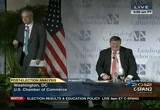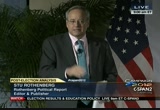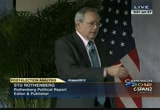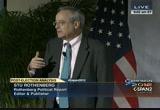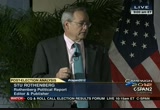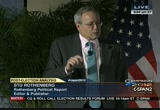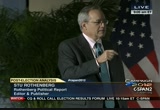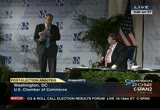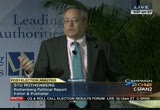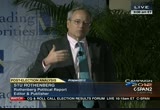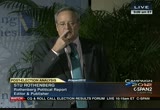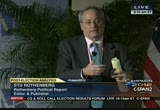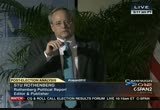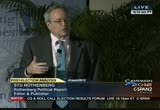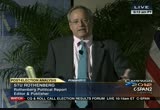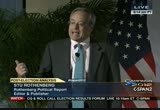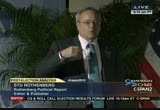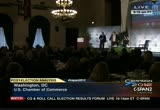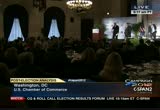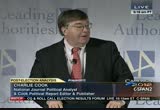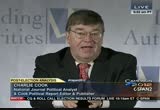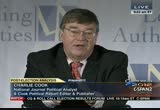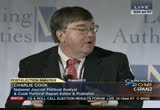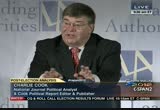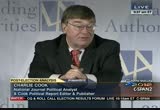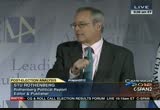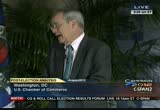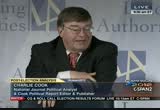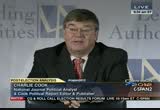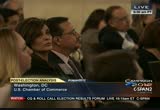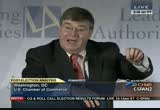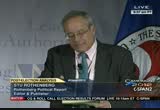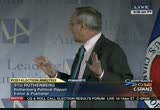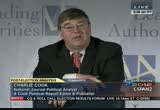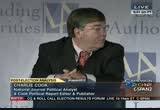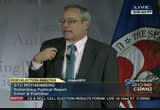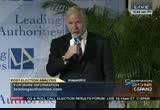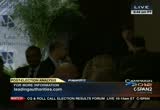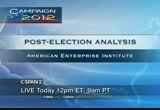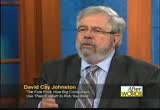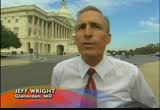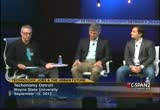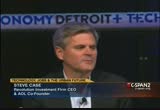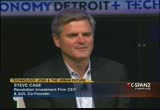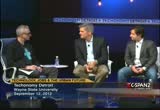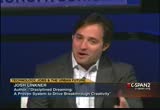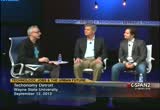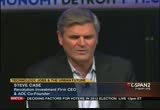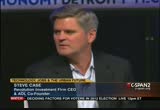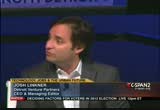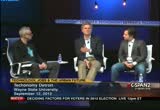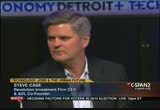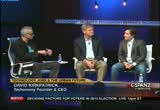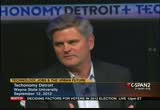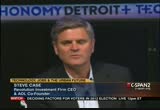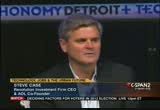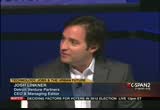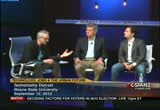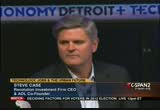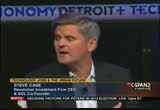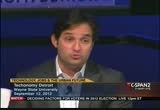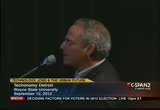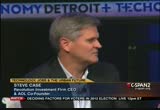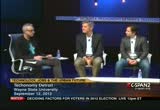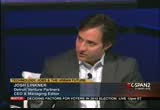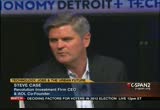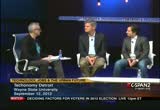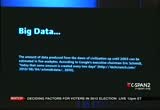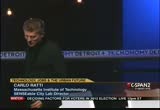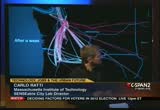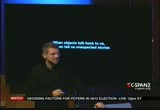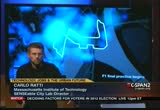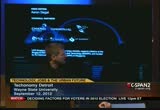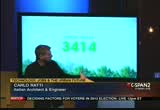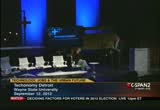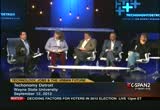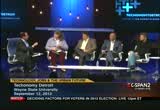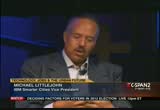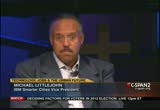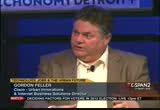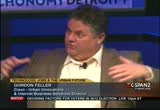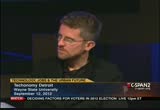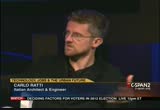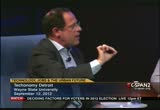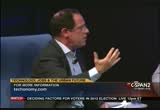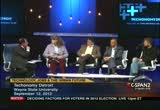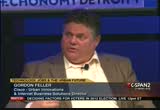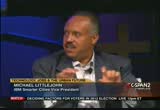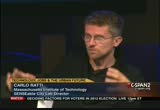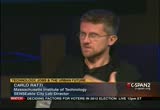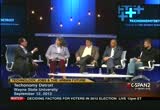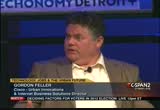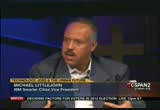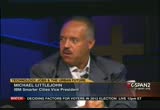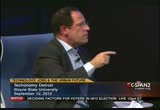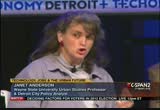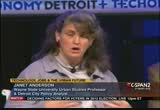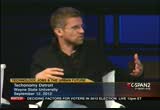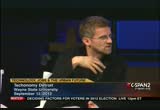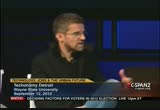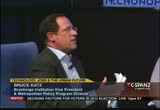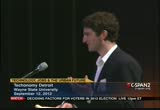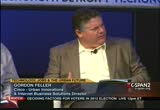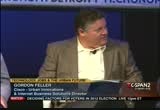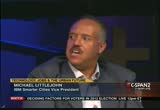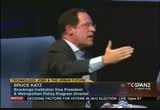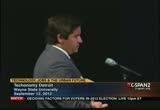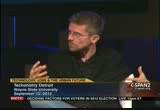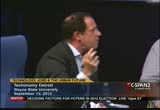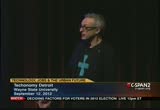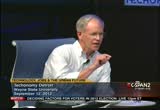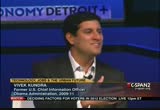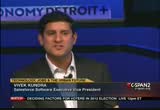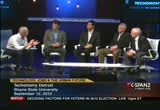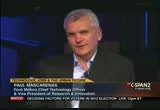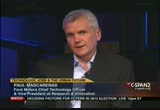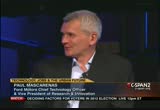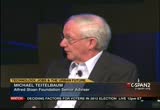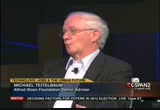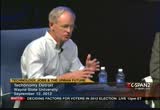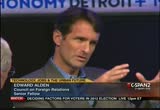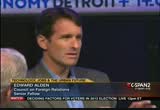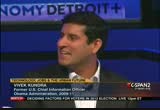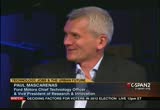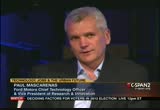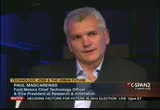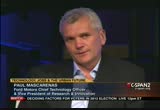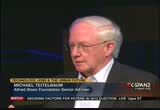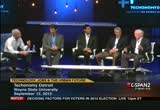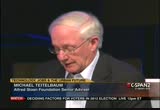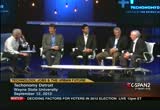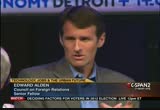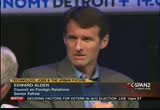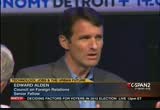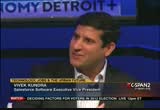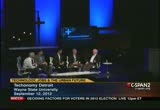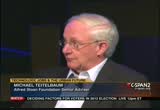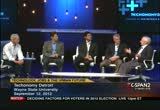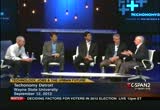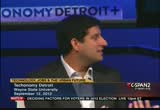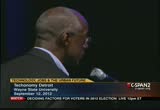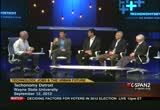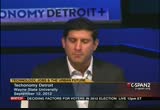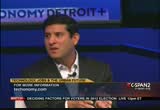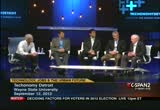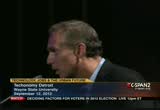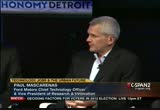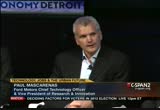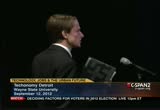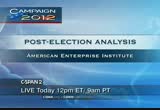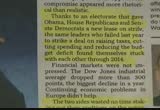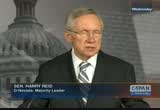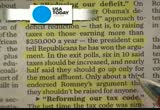tv U.S. Senate CSPAN November 8, 2012 9:00am-12:00pm EST
9:00 am
[laughter] so, if you're a republican voter, a sympathizer, you have -- you don't have a pleasant taste in your mouth after the election. i mean, we certainly had a mixed result here, a split decision. the republicans continue to hold the house. the democrats continue to hold the senate. adding a couple of seats. the president won just very narrowly, 50-48 eight, 50-48 nine. mitt romney made significant inroads among many groups, not all groups but many groups, younger voters. white men, white women to a number of constituencies. and printing have shown. and yet if you republican there's a feeling of him is not an outright defeat. it didn't go well. if you're a democrat, there is a sense of optimism hopefulness.
9:01 am
even the wedding 50/50 50 race but a lot of this again is about expectations. all right. so we've had three way the elections in a row. i think the one thing we can agree on is this was not a way the election. it seemed to me this was an election where the base was held and where the broad divisions in american political life became apparent. if i said to you exactly what was this election about, first of all you want to look at the congressional level and you want to look at the presidential level. but there were too broad different views of government i think, and whether government is helpful or hurtful, whether government can and should be more active, or whether there's too much government and government get out of the way and let the free market work its magic, creating more jobs and growth and opportunity. but the results within an
9:02 am
integrated part of the campaign, right? exactly what charlie talked about. the early ads in the swing states, the get out the vote. but on the broad themes, the presidential race split about 50/50. i think it did, however, show a slight advantage to the democrats and it has to do with this demographic shift. i remember when i came to washington in the 1980s, people were writing an article, i wrote an article for -- i wrote an article for -- remember that carline bowman -- was that public opinion? >> yeah, yeah. >> on the block, the electoral law, that there was a republican electoral law. i think you'll probably start to see people talk about a democratic electoral lock due to these changing demographics. so the hispanic numbers picked up, and we are seeing an electric whether democrats
9:03 am
democrats are doing well among african-americans, hispanics, asians, younger voters and white liberals. and that, that needle appears to have moved slightly to the democrats so that if you have a kind of normal base election, the democrats have a very slight advantage. i think most people will say we will continue to grow over time, unless the republicans do something to make inroads among what now are becoming some poor democratic constituencies, at least some. but if you look at the house races, you have to be cautious about the big message you are drawing. if the democrats again what looks to me, we don't have final results, but my count about eight house seats, half their games have to do with, come from illinois and california in a
9:04 am
largely redistricting game or so you democrats made small gains in house by the republicans still control the house. what would you say was the democrats message this election cycle, in terms of issues or policy? they talk about republican extremism, but wasn't there messaging two-pronged message of the congressional message? it also reflected in the presidential, but wasn't there messaging two-pronged? one, medicare, and two, the ryan budget or that was basically the democrats message. the republicans are for millionaires. look out the ryan budget. they want tax cuts for millionaires and they want to cut programs for the middle-class. and medicare is one of the examples, and the ryan budget showed different priorities and the republican priorities are wrong. that message did not really work. it was not a decisive win, sorting out the house level, for that message.
9:05 am
and think of this to my editor, i've got to credit my editor at roll call who mentioned this to me as us going out the door last night, we had three major house special elections over the last couple of years. one in pennsylvania, mark critz one that when. one in new york when chris lee, he is sending videos or photographs of his shortlist top left office in upstate new york, was replaced by the democrat kathy hogle. and the third, when arizona seat open up after congressman giffords stepped down after the horrible shooting. she was replaced by congressman barber. the democrats won all three of those special elections, and each and every case they said they won because of medicare. did somebody say medicare?
9:06 am
at what was, medicare. and then what the democrats had was, and we're going to use that as a template for winning in the twinkling election. didn't work at the congressional -- 2012 election. women look at the exit polls and we see why people voted and how they voted, sometimes it's not so civil. the exit polls have some very strange results. i'll get into a couple of these. is the country had in the right direction or sears off on the wrong track? right direction, 46, wrong track 52. keep that number in mind. wrong track, 52. what kind of job has barack obama done as president? approved or disapproved? i have improved your -- here. be approved is 54%. did you notice that? 54% for the president approval.
9:07 am
i haven't seen that in a long time. okay, 52% of the country thinks the country is headed seriously off on the wrong track, and 54 approved by the president's performance. now, you put those numbers together. the only way you can put most of us together is another question that i think was significant for barack obama and hurt mitt romney. who was to blame for the current economic problem? they gave a choice, the president or george bush? 38% said president barack obama, 53% said george bush. i think i'm this goes back to bill clinton. folks, even i -- [laughter] even i couldn't have solved this problem. it's all george bush's fault. and so i think, i think the president and his team at the democratic party still got a lot of mileage out of the bush years, and out of george bush's,
9:08 am
what the public conclude was is failing or shortcomings, whatever. you don't have to rebuttal he failed or had shortcomings can be decide for yourself just telling you what the public thinks, and i think that's what matters now. but i think, i think the lesson coming out of this election is that i think charlie is right. i think the lesson coming out of this is that the public now is inclined to favor the democrats, and the republicans need to do something to change their message, to change their reputation, to change their image. i think generally charlie is right with what he said about the republicans being extreme and too ideological. i think that's certainly true, but i think it's also the case that republicans have another problem. it's that the democratic base has a particular worldview and a set of assumptions and values
9:09 am
that increasingly in a polarized environment makes it difficult for them to vote for scott brown and linda lingle and heather wilson. the problems with republicans is that they're based -- that's a very ideologically driven voters, tea party folks, but part of the republican base is more open, friendly, to voting for democrats than the democratic base is for voting for republicans, i believe. i'm sure we could chew this over. let me give you an example. but me give you an example. heidi is a terrific candidate in north olympic terrific candidate and north dakota. mitt romney won north dakota by 20, 21 points. and heidi was able to overcome that. it's true that she won them as the president one north dakota, slightly less than president, that mr. romney one north dakota slightly less than the president one massachusetts.
9:10 am
but i think the republican coalition includes kind of a soft swing voter that is inclined to vote republican, but is more willing to vote for democrats. and, jim matheson surviving utah is amazing. amazing. john barrow in georgia, yes, a republican candidate against john darrell was horrendous. when was the last time you heard a challenger who refused to debate the incumbent? [laughter] spent well, you've got to know yourself. >> i didn't think it was a bad decision and. i just said it said something about a challenger. so i think this is an additional problem. i think it's easier for moderate centrist democrats to appeal to republican voters, then it is for kind of moderate centrist
9:11 am
republicans to appeal to democratic voters. but this is a problem, something we could argue. all right, let me take two minutes here and look at a little further and then will open up to qa and whatever, a lot of stuff to talk about. i think in the short term you are seeing some immediate republican? ability on taxes, and on dealing with sequestration and the fiscal cliff. and i talked to one republican be consoling the other day who said to me, you know, i think there's a chance that if obama wins comfortably with the electoral college and we underperform in the house or in the senate, and clearly the republicans underperformed in the senate. every talus the race went democratic in just as charset and the presidential, every swing state went democratic, kind of magnifying the outcome. but this consultant said to me right before the election, if something like that happens i
9:12 am
think the republican folks will give a little bit on taxes because the republicans, members of congress are just tired of being hammered for being for millionaires and billionaires. and if it looks as though the election goes against us, i think they will give ground there. so in the short term i think there is an opportunity to address some of these issues, including a large defense cuts and across the board cuts and deficit issues in short-term. but still count me as a skeptic in the long-term on the bigger question of taxes and spending and entitlement. because the way the political system has developed, it seems to me the way the parties are, sure, tuesday night, it was we are all in this together, we can do stuff. boehner comes out the next day, yeah, we can work this out.
9:13 am
out over time, over time the reality is still two very different parties with different values with very different constituencies. and when a republican starts to get too squishy, or a democrat starts to move too much to the middle, they get pounded on. sean hannity, rush limbaugh, ed schultz and rachel now -- rachel maddow. if you s.t.a.r.t. ii much in the middle, it's a tea party folks or the club for growth on the right or increase and you'll see groups on the left like this but i start seeing earlier, started getting e-mails from the pcc see -- pccc, which looked at success in 2010 on the right answer we can do the same thing on the left. and there is just more and more movements on the extremes in
9:14 am
ending parties, the party faithful to stay faithful and the part officeholders, and we still have primaries and republicans have to figure out a way to avoid todd akin and, frankly, richard mourdock, and, obviously, christine o'donnell. i look at the exit. there was no increase in the which vote this election. [laughter] >> which vote? >> which vote. christine o'donnell. you know, so the republicans have like five seats over the last two cycles where the sacrifice the seats by nominating ken buck and sharon angle and christine o'donnell. and republicans will have to figure out how to do this. and it's very difficult because when republican senate campaign committee gets involved in
9:15 am
primaries, they are attacked as washington tried to manipulative a try to kill folks in individual states you didn't nominate but if they don't get involved, they don't play a role and they just have to, outside groups come in and give them lousy nominees. so i do think the republicans will be going through a period of soul-searching, how they can appeal to african-american voters can how they can go to asian-american voters, how they can appeal to hispanic voters to look what happened in utah. mia love, right mia love. you love. she got a primetime slot at the public and conspicuous this terrific recruit, an african-american woman. haitian immigrant, an immigrant story. wow, and she ends up losing. so the party clearly is going to be looking for other candidates, new candidates. no, i will not talk about 2016, but you have to think that bobby
9:16 am
jindal will continue to be visible and more visible, that marco rubio, that, i don't know, susana martinez, nikki haley. the party needs to change. the democrats are in a very comfortable position now, i think long-term politically, where they have demographics on their side. and as long as they don't go to far left they will start off with a slight advantage. having said that, this is a crazy political environment, a lot of the political roles as i started off saying have been thrown out. and so more than anything else i advise you to expect the unexpected. not just the next two or three months, but the next five or six years until the country does decide one way or the other that it's going to choose between to grant fischer i think i'll stop there and we'll take questions, comments or arguments. [applause] >> charlie, can i add -- i just
9:17 am
want to add one thing because i know people, sorry, set i can't. i just want to add one question, exit question to which comes close to your view of? government should do more to solve problems, or government is doing too many things better left to business and individuals? we've seen this question asked over the years. government doing too much, government is doing to me things better left to business and individuals? have you seen this exit question this year? the responses, is going to answer, the responses from the public, government should do more to solve problems, 43. government doing too many things better left to business and individuals, 51. if i gave you that question, what you think that mitt romney would've won the election? but, in fact, a quarter of the people who said government is doing too many things better left to business and individuals, a quarter of the people who said that voted for the president. >> good. all right, it is a quarter after
9:18 am
nine. we are going to to a quarter to 10. we want a lot of questions, so you can identify yourselves, we will bring over a microphone. the conventional wisdom is that washington is dysfunctional and relationships don't count as much as they once did, but it was once sort of amazing to take a look at the electoral map from alabama to texas and texas up to montana, and that was solid red. and to look at states like oklahoma or two-thirds of the voters voted for romney, in massachusetts where two-thirds of voters were for obama. and it sort of hard to believe how we're going to get there in terms of compromise when the voters in those states that are represented by republicans and by democrats in their states, you know, are so partisan. >> yes. go ahead. [laughter] >> well, no. we were talking during the breakfast to someone about when you create these ideological
9:19 am
adco chambers in each party, it just makes it very, very difficult. it sounds like a good chance that nancy pelosi is stepping aside. you know, we don't know whether steny hoyer is going to move up or whether they move down to a generational thing, but, you know, you think of well gosh, holier, bane, they can go into rem and they're not too more rational people in congress. and yet could either one of them make a deal state within the caucuses? and you know, even if mcconnell and harry reid tried to put something together, they both have some pretty exotic people on their site. and so, no, you're absolutely, you're absolutely right. and then tossing one more factor. you know, you've got all the dysfunction on capitol hill and then have a president who basically has no relationship
9:20 am
whatsoever with congress on either side. u.s. virtually no interaction with members of congress. wow. >> let me, mark, let me just add, first of all, i don't agree with anything charlie just said. now, i agree with everything charlie just said. the key may be whether the president shows decisive leadership. now, i don't know what you all think they're i don't know what charlie thinks. i don't think that decisive leadership necessary is what is shown a lot of the time in the first term. it's not that he didn't show any leadership. he staked out general positions, suggestions, ideas, philosophies, the health care reform. but he didn't get his hands really dirty. remember the public option fight we had. where was the president?
9:21 am
if you send it to me, i'll sign it. you know, he let nancy pelosi take the lead on the public option. and on a lot of things, you know, we knew where he stood. he didn't twist arms. he just didn't seem to get involved in the details. is he going to do that now? if he does that, easy going to just come his idea of well, i've got a second term, we picked up seats and since another republicans to come to me? or you know what real leadership is, is going to your own party and saying, okay, i'm going to bring you along. because he has more sway in his own party than he will telling michele bachmann what to do, or telling ted cruz what to do, right? he will have more sway with them. so is he going to do that? i think that's an interesting question but i agree with charlie. he said and limited to, just as
9:22 am
the band and democratic leadership by broader political and private. >> let me get this one more time, and maybe i'm sensitive to this because you know, everyone in this room should read the robert cairo for falling on lyndon johnson to pursue additional already read the first three. at the fourth one, and it is available on cds. it's 26 cds long. and if you're curious how long that takes, that's a drive from washington, d.c. to tampa, florida, where they have the republican convention, to charlotte where democrats had their convention, fort bragg, back to charlotte, washington. that's 26 cds. [laughter] but i have this image of lyndon johnson spinning in his grave at the idea that there is a president of the united states that has minimal interaction
9:23 am
with congress. and particularly someone of his own party. and when you, let's just forget republicans and let's forget tea party people. forget them. just in his own party, wander around the hill as all of you to around all the time and ask members of the democratic at how much personal interaction you have with the president. and i have, you know, i hate giving political credit for anything, but they had that piece back in may. just pointed out that the president, as of may when that article was written, had not had a single conversation this year with this year weedeater kent conrad, chairman of the senate budget committee, or tom harkin, the chairman of the senate health education labor binge committee. phone or in person this year. now, you can talk about tea party and instructions and this and that, but if in talking to key people in your own party come and i checked with the cbs
9:24 am
radio who is a national institution and he's like the unofficial historian of the contemporary residency, the president played golf 104 times. been how many members of congress have played golf with him? do. john boehner once and jim clyburn twice. that's it. and i think there were 40 basketball games that are known and he played, there were 10 members in one game. and that's it. and go around community, go around to members -- to our democratic house offices of not freshmen or sophomores that it never had a single white house official walk across the threshold. now, let's say the president is 100% committed to getting a budget deal through, a grand bargain. what you have to ask yourself, even if his intentions are absolutely the best, and even if
9:25 am
he's absolutely committed to it, he is going to have to change the whole way he operates 100%. a democratic lobbyist friend of mine says a model of the white house seems to be no new friends. [laughter] so, i mean, i'm a long-term optimist and a short-term pessimist, but we will see. >> and the difference between bill clinton and barack obama is bill clinton wants any new friend you could find, and that was part of what he was so successful politically, and this president has a different way of operating. >> we're going to try to do speak questions, speed enters so we can get a lot of these questions. >> good morning. first, i caution you on the right in herman cain because there's a number of a sinner who thought ahead of the national restaurant association could be a viable contender.
9:26 am
[inaudible] >> if they could do 10 days, john sweeney could go the distance. i will give her my check right now. but my question was to all republican governors out there, a lot in lieu state. obviously, the republican brand is working or it's a different version of the band i can -- brand. what you think the differences? >> distance. distance from washington and distance from the national party. i mean, the thing is, it's funny, you know, you can obviously look at the elections are a different couple of ways. and i think the republicans could take some comfort in knowing that romney lost 50-49. but let's spin it around and look at it another way. i defined a couple months ago elevenths when states. republicans carried exactly one. i mean, romney carried exactly one out of 11. i mean, he basically one with john mccain one, plus indiana
9:27 am
which nobody really considered a swing state, plus north carolina. that's it. now, you go one out of 11, okay, then you have the senate costs. in our category we have 10 tossup senate races. and republicans lost nine out of 10. and i have to say this because i think that senator cornyn and all the folks at the rnc, i think it's one of the more talented campaign committees i've ever seen. and two cycles in a row that had the worst block, and i use lock in a broad firm because a lot of it was to what stu talked about a little while ago. when your party nominates people that are so exotic that they have little or no chance of winning general elections, that out to be very winnable, i'm sorry, that's not something that a campaign committee can do
9:28 am
anything about. and as stu said, if your party bosses from washington dictating where candidates are going to be, or do you apply yourself to be at the mercy of a bunch of lactose. spent exotic. -- [inaudible] >> against barack obama. the stimulus, chrysler, bank takeovers. and so they ran at the right thing to the other answer is no matter how partisan the state, they will send the opposite party to the state's house, the state mentioned him but they won't sink into d.c. so republicans get a government in rhode island, massachusetts. and democrats get elected governor in, sullivan in wyoming, sebelius in kansas. and so the most republican states. but the federal government is different. republicans don't want is in the
9:29 am
democrat to d.c. from every public and so and democrats do what is in republican to d.c. so i think both republican governors actually may have lucked out when they're up again next time in 14. there'll probably be able to run against a second obama administration. but it don't think that says something necessary as fundamental as the timing. >> take a look at how close mike pence got elected governor in indiana. i mean, that should've been, i mean -- >> four points. >> you spent that should've been 12, 15. >> there's a big article in the "washington post" today on independent business expenditures, particularly, you know, in the fall election. what do you think? why didn't that have much -- >> what do you think speak with mark, do you know what we are? you're asking me that you're?
9:30 am
i've looked at the article. i happened to look at the article. i guess my view is this, mark. it was so much within the political system, it was lost campaigns. billion dollars in tv ads that, first of all the question of quality of as, and that's an interesting question we can ponder, disgusted but then the question is just the sheer weight events. that's what -- one side has a huge financial advantage, gross ratings points advanced by this time they were so many ads and so missed his i think the ads were devalued but i think it's as simple as that. what movie election? what movie election was a debate which was a news event. which is bill clinton saying, if i, right, that was news. maybe the hurricane. i mean, it was not the ads. that's my view. >> what was the times piece two weeks ago, las vegas had passed the point where they had their 73,000 television ad in the las vegas market.
9:31 am
you know, i think in a lot of business, folks want to invest in something that would help the republican party that might open up a couple hundred field offices around -- some of the obama field offices never close after a week. -- '08. maybe countably something like that. stu is absolutely right, the saturation level at the advertising where, i think it's weak states two kinds of people. that people who literally hitting the button and become a political ad came on, and the people that hit the mute button every time a political ad came on. >> i think we have a question in the middle. >> romney was pretty far from the ideal candidate and sound like president's approval ratings on the upswing, but congresses ratings are, if not at historical, pretty darn well. but there wasn't a whole lot of
9:32 am
turnover in the house to is the reason why we didn't see more churning in the house? >> well, the cliché is whether having voters pick their elected officials, we have elected officials taking better photos. and the redistricting process has insulated so many members of congress where, you know, the only reelection concern they have are winning their own primaries next time. and so when the primary concern you have if you're a democrat is looking over your left shoulder worried about a primary next time, a democratic primary challenge, or if a republican, your biggest reelection challenge is looking over your right shoulder and anticipating a possible conservative challenger in the next primary. you know, most of these people, it's pretty hard to imagine what they might have to do to lose
9:33 am
reelection. but it involves barnyard and animals. [laughter] spent more exotic. >> i mean, to me i no longer look at congressional approval. i think it's a number that has no relevance to elections. i don't know why they asked the question anymore. >> ghana, bilbray, london, crates, all lost on the basis of redistricting. >> not mac. not going back to your district makes a difference. >> that does. >> it is becoming more and more hispanic. let me just say, part b is, charlie is right to go away you get 12% congressional job approval or 10% is if republicans and democrats give low ratings to the institution.
9:34 am
but that doesn't mean republicans are going to vote against republican candidates. republicans blame the democrats. democrats blame the republicans because i think charlie is exactly right. that number shows a lack of confidence in the government and the institution and dissatisfaction with congressman and whatever, but it doesn't predict the vote. >> with the question right over here. >> you both mentioned demographics. so it republicans today, you know, party of grumpy old white man living in a modern family america. what is the path forward, particularly related to the hispanic vote? >> i would say first, angina, i have to think of myself, i'm a businessman, as sympathetic with the business community. i think the business community has not taken a leadership role on the immigration issue. and finding realistic reasonable compromise i is and felt it witn the republican party, and
9:35 am
getting some of the more exotic opinion leaders and talk radio people to shut the hell up. so i think part of it, when you're in a hole, stop digging. and the republican party needs, they need to, number one, address the immigration issue and stop alienating latino voters. now, look, i think, you know, you can, i don't think we're ever going to see any appreciable number of puerto ricans ever voting republican. but with mexican-americans and cubans already do, but with mexican-americans, as mexican-americans incomes rise, the willingness to consider voting republican goes up. and yet we have romney, i think it's one of the worst, if you're going to say what were the two worst substantive decisions made romney made, one was idle bailout, the second was immigration.
9:36 am
and compounding what he said during the primary last summer when he spurned marco rubio's dream act compromise, so that's number one. and number two, just shut up on social cultural issues. you know, conservative evangelical christians are not going to be voting democratic anytime soon. and i think they need to deliver that message in private, quietly, and get the heck away from the. and if they do -- let me ask, how many times in the course of the year to all of you here someone say well, i consider myself an economic conservative, but. and you are still in the rest of the sinister and there's a boatload of voters that the republican party is basically pushing away, and that mentality leads you to people making a topic in kind of statement, and people making the kind of
9:37 am
richard mourdock kind of statement. i mean, it's kind of like it's a hermetically sealed party that perpetuates and encourages this kind of talk that in normal society is absolutely unacceptable. and you can't have that. >> well, i think, i think it's a little harder than what charlie is suggesting. your state legally recognized same-sex marriage. yes, 49, no, 46. that's a dramatic change from 23 years ago. think what the response to that would've been 20 or 30 years ago. the problems for the republicans is a huge chunk of the party is culturally conservative, highly religious voters. i'm not sure it's so easy to simply dismiss the cultural issues for evangelicals. turnout is really important. what we see base is crucial getting the base energized enthusiastic. i think the republicans are kind
9:38 am
of caught between a rock and hard but i think they need to somehow be seen as a more tolerant on these issues. but i don't know how much a liberal from that short term but i think there is but i think charlie has generally the right direction of course but i don't know, it's not easy to get the. on hispanics i would've liked to have seen with it and it didn't come any difference, we will now, we can speculate whether marco rubio had been on the ticket. i just think -- >> a cuban on the ticket and that's like saying i'm going to suck up to the irish book are allocated englishmen. [laughter] >> for this reason. it would have a lease conveyed the sense of a broader republican party. i mean, yeah, it's true isn't it, that paul ryan look like one of mitrani's kids? right? didn't convey a sense of diversity.
9:39 am
republicans are knee-jerk inherently opposed to diversity. that is actually the case. that's kind of one of the republicans, platform. it's not platform but republicans have a knee-jerk reaction to the. those multicultural imposing diversity on this? no way. i think the party, it needs a different look, doesn't? different spokesman, different people out there. so you're right, cubans and mexican-americans and puerto ricans. but i think they need to present a different look. >> sarah palin? in the back. >> good morning. eric schultz, among the political phenomenons that intrigues me the most i think ticket splitting seems to interest me a lot but i wanted to get sure thoughts on that. just looking at some of the
9:40 am
results, montana elected a democratic governor, democratic senator, and the president only got 42%. in missouri, nixon and mccaskill, both democrats got 55%. yet obama topped out at 44 and lost every county except jefferson and st. louis and st. louis city. in west virginia, they elected him governor, democratic senators, including reelecting mentioned who got 61% and yet the president topped out at 36% to 25% difference between joe manchin and the president spoke in west virginia. so just where to get your comments on ticket splitting in general and then maybe west virginia. >> i think you've got three different things in two different situations. unicom in missouri, let's face it, todd akin contaminated the environment and made it very, very hard for, you know, i think it didn't really help of the republicans in the state, and
9:41 am
nationally for that matter. but the thing is in places like montana and west virginia, when, you know, you have democrats who could have told you on january 1 -- i'm sore, well, could have told you four years ago that president obama's going to be a liability in my state, and i'm going, i'm not going to have to put, there never will be any lack of distance between me and him at any point, and so there's no, you know, it's not like they have been cozying up to him and then coming in, the picture that republicans had of joe manchin and president obama together, there was only one reason they could get the picture. because they have to be at the same funeral. i mean, that's the only reason the picture even existed because there's not a second picture of them together. and so, these guys have a lot of notice to create a lot of
9:42 am
distance, and were able to do. >> i have other examples i could give you. richard to say in massachusetts, a gay, pro-gay marriage, pro-choice, fiscally conservative but moderate style is sent to republican lost, i expect because the partyline voting industry. yes, scott brown ran ahead of his presidential nominee but he couldn't run far enough ahead. and the fact that he lost to john tierney when john tierney wives relatives, a significant number of them are either under investigation or i don't know and i admit are made even more, is stunning. in connecticut's fifth congressional just, by chris murphy ditch and northwestern part of the state, a pro-gay marriage, no choice, republican who came in that company then
9:43 am
interview he said i want to be, i want to be the test of whether there's room, where there's room for and a role for the old style moderate republicans from the northeast, lost in a district that is a competitive district. there was some ticket splitting in those but not enough. and so i think there are more those districts but i think it's more -- you take out specific examples. [inaudible] >> the trend is the opposite way. now, can you always find some examples that are counter to the trend? of course you always can but the general trend is, we are putting in more parliamentary way in this country than we used to. >> unfortunate our time is up. i would like to thank charlie and stu very much. [applause] >> i'd also again like to thank
9:44 am
the chamber for a great partnership and to our sponsors today. if you could, please, fill out the survey and had to the leading authorities representative, and just a final word, on december 14, leading authorities will host our final conversations with our program in the museum and the topical be the fiscal cliff. thanks very much. have a great day. [applause] [inaudible conversations]
9:45 am
[inaudible conversations] >> we have more postelection coverage coming up today on the c-span networks. about 10:15 a.m. eastern cq-roll call host a series of panel discussions looking at yesterday's results. including exit polls, makeup of the new congress, economic issues and how all this affects k street and lobbying in the upcoming lame-duck session at the next for you. that will be live at 10:15 a.m. eastern on our companion network c-span. and you on c-span2 will go live to the american enterprise institute at noon eastern for a discussion on the election with fox's channel political contributor michael baran. roll calls congress inside out canis norman ornstein and aei's national research initiative director henry olsen. they will become the deciding factor in how voters cast their ballots and issues important to
9:46 am
voters. that's why begin at 12 noon eastern here on c-span2. >> america ranks 29,000 feet of its internet behind such as the ukraine. moldavia and ukraine. we pay the highest price in were by far. i one measure with a 38 times with the japanese pay for bit of information. if you buy one of these triple pay packages and i have one, you pay on average with tax and use $160. in france, you pay $38 u.s., and you get worldwide calling to 70 country, not just in u.s. and candidate. you get worldwide television, not just domestic, and to in his 20 times faster upload and 10 times faster downloading. you are paying less than 25 cents on the dollar. all these other countries understand a fundamental principle. in the 19th century, canals
9:47 am
and railroads were the key to economic growth to an dutch relation, and you had to move heavy things like steel. as a 20th century came along, it was highways, interstate highway program for example, and airports that were crucial to economic growth. now is the information superhighway and what does the industry say? don't call it that way anymore. >> david cay johnston on the many ways corporations call i can try to rob you blind. on "after words" this weekend on c-span's to booktv. >> c-span program is good because they try to, both sides of issues, and your moderation especially on "washington journal" to a good job of staying detached. and not getting into offering their own opinions, just kind of costly saying hey, what is your opinion. very comprehensive book covers a lot of different, both the house and senate and different, other
9:48 am
woodrow wilson center and different other public affairs centers here in d.c. that i wouldn't normally be exposed to. >> jeff wright watches c-span on comcast. c-span, created by american cable companies in 1979, brought to you as a public service by your television provider. >> a look now at technology and entrepreneurship from a recent conference in detroit held at wayne state university. speakers include aol founder steve case, tim draper. former u.s. chief information officer. this is about two hours. >> thank you so much for getting us started. thank you all for being here. it's really exciting to finally have this thing and we. we've been working on for an awfully long time. what we do at techonomy is mostly up to now it's been sort of retreat like invitation only,
9:49 am
leaders thing in the desert and i would really want to get our message out in the broader community, particularly in the united states where we think there's some messages that are just not sufficiently understood. and that's what you, i hope you will be hearing throughout the day today. and the message is, these events are focused on four issues. u.s. competitiveness, the future of jobs, economic growth, which is adequate to the first to come and then the revival of our cities with detroit as case study number one. we are very proud to be in detroit because we see it as a great city has incredible potential that we just love to have help participate in the dialogue in order to move that process forward a little faster. but i think what we wanted to at techonomy over all is to change the dialogue generally about how the world and the country thinks about technology. because we don't think that it is understood or appreciated
9:50 am
help rapidly the entire landscape is shifting because of tech. we know today literally apple is announcing the next iphone. that school. that's just the most obvious example of things that continue to move at astonishing speed, and there's developments literally everywhere you look. and we don't think leaders generally get that. so i'm going to just give a couple of little and housekeeping things that we need to know. for one thing, there is an app, so look that up and download it but it has all the programs but it will be in real-time. all day. please use the app, detroit labs made but it is very good. everything there is on the record. we are really in to q&a in hearing your voice from the auditor quits to mic from either side. almost every session will have you guys up here to get messages ask a question that you can make
9:51 am
a comment, but keep it brief. we are fiddling and live streaming everything. the live stream is a veil at techonomy.com, and thanks for live stream for doing it with. is a twitter hash tag, number sign keep the detroit. please use that, and now we'll go straight into our first session. some going to take the blue chair. this session, please, steve and josh cannot enjoy me. we're talking about at a partnership and american robins. at a pernicious one of the key things that lines to at this event. i would love to wind even more tightly with this session, and that's why we have these two guys to start today. i me, one of great at winners of the american economy, steve case, who not only has such an impact with aol, but now with revolution is funding and helping to develop a whole range of companies with a variety of industries. meanwhile, but in the washington area has gotten incredibly
9:52 am
involved in trying to help the u.s. government think more intelligently about competitiveness and entrepreneurship in particular. josh linkner, a local store here who runs detroit venture partners as an sure many of you know, it's are from detroit you certainly know that, a supporter of this event which were very grateful for, and i think it's symbolic of incredible new energy that is developing in detroit and i should also say that josh created a company called, in 1999 here in detroit, operating all this time. two weeks ago it sold for a nice exit. here's a story of a company, a local copy that came from here, when all the way and he's an real well with the. even vested in a ton of other companies. so i just want to start asking you, steve, you know, when i told you about this you like it neatly, you want to be a part of the trick why do you think techonomy detroit was a good idea? >> i didn't think it was good at
9:53 am
that is a great idea. i appreciate that you're willing to do this and shine a spotlight on detroit because to me it is not just about detroit commission of the story of aqaba notion in america and how it really is spread more broadly through the nation than we sometimes relate. silicon valley is the epicenter of enormous innovation, tremendous companies there, exciting, something we're all proud of. but there's also a lot of companies all across the nation that don't get as much attention to i think it's important to shine a spotlight on them. but in detroit there is something special about it because in many ways detroit was silicon valley 50 years ago. this was the epicenter of innovation, at was was at the time the most fast-growing companies in the world when it was the automobile industry. it had a tough few decades. the population has dropped in half at its peak which is startling. but it's finding its way back to the commercial that aired on the
9:54 am
super bowl, clint eastwood, i think is that a commercial pilot and then he is talking to him teachers to be that as it may, and awesome kind of story of kind of detroit fighting its way back and not giving up and folks like josh to investing in companies here. i think it's very important to so partly it's a detroit store but more broadly the story of a sort of the rise of the rest. the region solved by the nation that are emerging as i did renewal hotbeds and if we're going to get our economy back as a nation and get our unemployment down, nobody's happy with a 2% growth rate. no one is happy with an 8% on the place to focus and entrepreneurship. that really is the driver, has been for 200 you. we didn't become the leading economy by accident. we need to continue to build on that momentum and recognized that it is sort of the secret sauce to build the american economy. as a nation went to double that on onto partnership not just a
9:55 am
sudden valley and your although they are awesome but in detroit and cleveland and st. louis and denver and a lot of other places. they are also becoming kind of interesting emerging markets for entrepreneurship. >> i love that you said it. josh, you're sort of the ultimate sumo of local financial support for onto partnership and entrepreneurship it's a. but you think that message is understood in detroit? how widely do you think that people get that here speak was before i begin, david first of august thank you for bringing techonomy to detroit. this is a town that is on the rise and you coming and shining national attention is making a big difference. and also thank you for your leadership, for your unwavering support of entrepreneurship throughout the country and specifically here in detroit. i just want to recognize both the you for doing this today. [applause] >> you know, here in detroit it's a weird, it's like you can bump into somebody and they say oh, i do everything is on, they
9:56 am
are really familiar with things. and then you bump into somebody else and they don't have any sense of it at all. so i think that defense like this and the continued support of indeed, i think we have to screen from the mountaintops that detroit is open for business. this is a great place to build a tech cover. i think we saw a lot of work to do to get that message heard both locally and certainly on a global basis. >> steve's company is called revolution. jack dorsey he will be here later today was giving a speech, was it yesterday, the day before yesterday in san francisco and talked about the need to be a revolutionary. that that's the way founders and entrepreneurs did you think of himself and i personally have had a theory myself and about about in regards to zuckerberg and facebook, the founders are the most impactful social revolutionaries of our era. but that implies a sort of insurgency that i wonder if it is widely and a understood. that's what i'm driving at the any thoughts? because if what you guys are
9:57 am
doing is truly revolutionary, indeed the people ought to be really scared of it without to really be getting on board, or both. >> out of her nose were trying, there are two types of entrepreneurs i should say. there are some were looking to create an interesting product or service and have somewhat modest ambition. they are just trying to start a business, and that's fine. they are an up or in part of the economy as with and the other which really are kind of trying to change the world. they are swing for the fences, trying to do something that is more of a long-term built to last kind of thing, not a short-term kind of build to flip kind of thing. they have to have the passion and perseverance to see if you. i saw this where we started aol 27 years ago, only 3% of people were on onto an online they were on average one hour a week of most people that we are crazy. nobody wants to do this stuff. we stuck with it and it took is really a decade before we really got traction are confined in the mid '90s things kind of took off.
9:58 am
oh, overnight sensation. we were at more than a decade them country and -- -- the opportunity that there are huge sectors of economy, education, health care, energy, that haven't really been disrupted that much in the last 25 years, but i think of us the first internet revolution and getting everybody to believe it was important to get connected from multiple networks, that's sort of been accomplished. the second internet revolution is how you use the antiquity and now the mobility of the internet to transform other important aspects. those are where the great out of a nurse all across the country are focusing. we do need to support them as a nation because they are the industries that are going to thrive the future. initially it was for the agricultural revolution, kind of the midwest as for the revolution. sort of the finance and media revolution more recently, the technology revolution.
9:59 am
the next wave is what we need to be positioned as a nation and we really need to recognize these entrepreneurs are in some ways american heroes because they are the ones are taking the risks, starting these companies that can change the world, but also make sure we have a robust growing economy. and what is now a much more competitive global world. >> yeah, i think zuckerberg's and josh linkner's body mechanistic but you have a very positive way to talk about entrepreneurship. he wrote a book about creativity and the role of creativity incomes. do you think of yourself as a revolutionary, josh? >> i think of myself as a disruptive. and i think that many of us have that capacity if we're willing to go for it. i couldn't agree more. ..
10:00 am
when people reinvest in the community that's when people are going to put the stick in the ground and say we've made it happen. >> and the talent aspect is the most important thing around entrepreneurship therefore around the economy is talent and one of the reasons they are fighting the battle to build bipartisan support for the legislation and in high school immigration, may be for education and then to start -- >> i love the are doing that by the way.
10:01 am
>> they are job makers but it also happens that a regional level so how do you get some of the people that didn't leave to come back and believe that now is the time to come back because there is a burgeoning bustling economic system and maybe they grew up here and went to school around here. obviously a lot of great universities but stuff they had believed because they didn't see the path forward for themselves and their family and now they have a reason to come back. that's why the work josh and others are doing is important to create that sense of possibility and momentum to get capital flowing then you start getting the network instead of network density which is one of these regions that really takes up but it takes leadership and in the last year and have the american partnership has tried to build up their regions but ultimately it comes down to somebody come and entrepreneur who says i'm going to take on this challenge and rally folks within the
10:02 am
community and try to connect them to resources outside the community and let's get moving this is our moment and time let's get going. >> i love what you said about responding to the results because i couldn't agree more there's a lot scale to that and i don't mean to hammer on this issue of urgency but i will because i feel it very strongly. i travel to china of what and another result is happening is in places like china they understand the role of the city better than we do. they are investing very methodically and infrastructure, financial support for entrepreneurship and education of very targeted sorts, and on each year that the kind of results that we will start to find maybe a little on the late slide in places like detroit is the effect of all of that investment in places like china and taiwan and even malaysia and other countries is going to put us we behind the curve by the time we realize those.
10:03 am
>> to you worry about looking at it and globally? >> i do and what can you? you play to your strength so if we try to compete and try to be the beijing of the u.s. or the silicon valley of the midwest we have to be the troika of the detroit so we have to stop apologizing for what we are not and celebrate what we are. we have beautiful buildings that are waiting to be filled up and terrific roads and hospitals, water, world class airports i feel like we have to do is shed ever skin like a snake when a snake does that they go on and they can grow again. we have to stop apologizing for yesterday and complaining about the past. enough, stop, time to build great companies here in detroit. >> there are two battles going on. one of i do worry about is the global battle over and entrepreneur should if you look
10:04 am
at the history of america it is the history of on jupiter's. guess what other people figure out this entrepreneur should, risk-taking so that many countries including some you mentioned that are aggressive in trying to make sure it's easier for people to move from an immigration standpoint and centers are around capital to make significant investments in basic research they are stepping up their game and if we don't double down as a nation there is a risk. the good news as we sit right now we are still the most entrepreneurial nation in the world. the bad news is people but rise globally and people are getting much more aggressive. here in detroit and many others around the nation to get their act together and create the same kind of thing talked about and emerge with robust growing economies are not innovation and
10:05 am
entrepreneurship and it's important on the technology side there are technology companies and there are other industries the of the technology overly as well so in some ways everything is now a technology company that we don't want people to think we're focusing on trying to create. a company like chipotle which basically a burrito is a company with tens of thousands of employees with tens of billions of dollars. wal-mart the one store in arkansas they said people in small towns get access to more products at lower prices technology is both companies and funding but there are also many other companies that have this technology overlay and it's important to recognize that
10:06 am
manufacturing for example which is important in this reason is being reinvented because of the juxtaposition of not just of manufacturing but also technology and the design to do things in new ways with teams is reopening that opportunity. >> if people have comments or questions, please come to the microphone. the company i love is an example of that the guy that runs zara joost technology on the internet to connect with workshops where women are taking malkoff patterns and producing them so fast they were able to knock off eveready else. that is certainly not an act that this to -- that is taking retail. summit technology is an na boehler so the use the technology to be successful. wal-mart used technology.
10:07 am
we have to have the original idea to begin with and i think one of the things they've done is they empower their people so a trend in san francisco bay don't have to salute the flag and a good to corporate headquarters. i think what we really need to focus on our couple key things. diversifying the economy, we need a robust basis but now we have to diversify. one of the reasons we suffered so greatly is the entire city was tied to one industry and when they ran into trouble the entire region. the second thing about technology is these are companies that are cabbles that can scale quickly. what used to take decades to create a significant amount of jobs can now in a couple of months. so i think it is imperative that the local universities and communities rally behind entrepreneurship because it can make such a big impact so quickly. >> something i talked to both of you about and i feel passionate
10:08 am
about because i know you do this, right now and this is incredible in a place like detroit the tools or accessible to anybody with things like the amazon services, anybody anywhere can build something with incredible scale, the ability to scale and they don't need the traditional location based advantages or even financial the advantages and one of the things that we are going to dhaka about more is cloud funding which the job act you have worked so hard to pass really facilitates. i would love to hear either or both of you talk about this new landscape of the cross funding and some of these other tools make possible. >> it's much easier and cheaper to get companies started in what used to be and that enabled a lot of entrepreneurs that otherwise wouldn't be able to do things to do things. it's not that it doesn't take as much talent as capital. on the internet nobody knows or cares where the diners are or
10:09 am
servers, they are looking for something they find of value in. a crowd of funding, for those that don't understand, using the internet to get -- to aggregate small investments from a lot of people to be able to start a company or grow a company had this legislation that passed basically legalized crawled funding. there was a law passed that basically said you can only invest in companies if you're rich you can't invest this allows the kind of democratized access investing and also individual investors that want to invest in the democratizes access to capital for entrepreneurs. it's public not that important or helpful in silicon valley because there's tons of money in venture-capital in silicon valley. it's important in places like detroit where there's not that much capital so you have the bill the next year when the sec writes the rules to basically put your business on-line, explain why you think it's a good investment and people can
10:10 am
make up to $10,000 each and if your income is a certain level there is a way to kind of protect investors and people can raise up to a million dollars in total through this mechanism into the would be the difference if they haven't started a company or able to scale the company so i think it's an enormous opportunity for underserved regions and sectors if you are a silicon valley focused on the media come here in detroit focusing on expanding some product you're trying to develop and you want to find a way to take it to scale i think it's good to be very helpful. >> talking about detroit if we could have 500 bustling companies that are successful in the revenues no one would say no thanks. it would be fantastic. why aren't we there? what does it take for a startup?
10:11 am
you have to have great ideas which we have plenty in this region, great talent command of the third is capital which historically we have been restricted on some of the jobs act and the idea of allowing the capitol to flow freely and reducing the friction would enable entrepreneurship. the other thing that silicon valley as to any better job than the trade is a culture of risk taking. in detroit if you feel that is a negative thing and in silicon valley is a badge of honor so what we need to do is celebrate creativity and response will risk-taking and it doesn't mean that the world is ending. >> i'm glad you said that. please identify yourself. >> good morning josh and steve i want to thank you as well for a tremendous program. one thing i've witnessed in the past 20 years as an entrepreneur working with entrepreneurs is a tremendous amount of intellectual capital locked up within our corporate entities around this area. huge opportunities of innovation, for the reason we are not used to technology out
10:12 am
has been by some major companies how we pull more of that now? those are market-driven opportunities that have much higher success rates i think then maybe the pure start-ups that are theoretically driven. maybe you could share some ideas. >> who are you again? >> mark benet. islamic i think there are a lot of great people in reorganizations. there are people in the d.c. area where a lot as focused on the next generation health and focus on security. i think they are very, very talented people but so far they've chosen to stay and what they perceive to be a safe world in terms of the company puts around for awhile and will be around for awhile. when i was graduating from college that's the sense that he would find a job and stay there for your career. that's changed dramatically because people are moving around a little bit more, but also because people recognize
10:13 am
including unfortunately here in detroit that it's not the states that joined the companies. the disruption does impact the company's and the idea that gm or ford for your entire career people now realize it isn't as clear and open to other opportunities. some of that there are different skill sets getting the people that do have that created innovative spirit that there may be an opportunity with some of the companies developing here and there isn't time to jump shift if you will but even more importantly how do you get the folks that left detroit to come back here. i'm sure there's tens of thousands of people that are born and raised here in this area that would love to come back but decided to leave because they felt there wasn't a future. but school talent drawing them back i think is also a big opportunity but it's all about talent. it's an idea and post capital was the most important ingredient is talent.
10:14 am
one of the things that is also an important ingredient is timing and education. i don't want it launching our day to get finished without mentioning it. and another community that is of great interest and concern is not only the people working in these great companies that are not working at all and detroit has way too many of them and i was curious what the prognosis is for the sort of really marginalized disenfranchised population of detroit. a quick comment from either of you. what do you think is going to happen or what should happen and what do you think is going to happen? >> if the economy grows and if we can get the economy going perhaps they aren't going to be a software engineer in coding flash. what they can do as the economy grows it will create additional jobs, optimistic that the entrepreneur ship will be as part of it will spend beyond the boundaries of the offices and go
10:15 am
much deeper into the community. another quick point on education which is really where it starts, there is a huge challenge in the detroit public schools as well as promote the country and what we need to do is start retooling our educational system for the current era because it is an outdated system was built 50 years ago. we have this nonsense with no child left behind, meanwhile every child gets left behind because we aren't teaching them to teach and up to the landscape at hand. it's a big problem and one that will continue to evolve, but if we can create an economy that is bustling and hustling it can definitely make an impact on all of us. >> i think this issue of education and particularly around some of the skills for the future is what some refer to as a stem subject, engineering, math and so forth is important and it that we basically do a better job of growing our own talent. basically it's important retraining people that have had a different career and are looking for an opportunity is obviously important. but as i mentioned -- and i know
10:16 am
as controversy -- the issue of immigration is also important. half the people coming to the universities to get a ph.d. and masters are from other countries and once they get a ph.d. and master's we take them out of the country and force them to go home. we should ask them to stay or make it easy for them to stay. because these are the people but to create a google and some of the great companies that create tens of thousands of jobs. so trying to make sure we win the battle for telling the globally is important right now for a lot of reasons i a understand the argument on both side. those folks are going to other places and they are getting to become more vibrant on japan our communities and we are going to say we blew this and now's the time to make sure we are focused on not to create the company for the future and the united states to read >> i can't think of a better way to launch the conference.
10:17 am
i hope to have you on the stage again very soon. >> thank you all. [applause] now we are going to go into some city stuff which is a big part of the femur with the entrepreneurship and i'm going to turn the stage over to the car all of the city lab at mit and he's agreed to talk about it provocative topic at technology. so come on up. >> good morning everybody. i wanted to start with something everybody's spoken about these days. the big data assumes if the
10:18 am
information was from the beginning of humanities in 2003 this was produced yesterday and today. there's another way was you cannot put in an xl spreadsheet but it has big consequences in cities and this is what i would like to talk to you about today. our cities have layered and the way we understand them and can respond to them we believe is changing dramatically. collecting inflation from the cities and we can process the information and respond.
10:19 am
among jamaican an example of something that's been happening. think about formula one if you wanted to win a race you need physical solid things but actually today if you want to run the race is system made of thousands and thousands of computers connected to the computers and a lot of information is analyzed and collected and processed and decisions are made in real time and the same is happening today in our cities. if you are an engineer it's basically made of two components you collect information and respond to that information and it's really what every system does for every living system
10:20 am
does we test each other and respond to this information. it's almost like every outcome in the city is becoming like a sense and they want to share with you the capitol projects that show these dimensions. it started by looking at something we think is a big issue today about the computer to read you know everything about, you know where it was produced, how it became the machine. the global supply chain. however a few years from now when we throw away the computer sometimes this happens to it so what we decided to do is recently an electronic voice
10:21 am
10:22 am
that as a surprise because everybody has a small piece of the chain and we could actually follow the whole chain from the beginning and it also be travelling across the country so it would go from seattle to chicago. so and then on optimized way. what did we learn from this project? we have this information from the cities in this case about waste and what happens to things we throw away we could probably redesign the engineers optimize such systems so we could produce a lot of inefficiencies that you saw in those traces.
10:23 am
another thing is all of this data if it gives information about what happens out there than it can promote behavioral change and one of the most telling things was following somebody that would us well i used to drink water in plastic bubbles and put them outside of my door every day and following the project to stay there forever and not because of this i stopped drinking water in plastic bottles. there is a third thing that we discovered more recently he saw a lot of stuff including the tags that tell you where to go and here is a video about. if we try to fix the sound it may be useful this was on the
10:25 am
[laughter] i wanted to share with you another example about data strings together this would create singapore so this was using sensors but imagine he could collect much more information with real-time what's happening around yourself. so here it tells you how the city is beating. they are using all of these communications. in special events in singapore
10:26 am
that's how people moved to their and the city changes behavior. uniques taxes in singapore it's impossible but when you get this information you can get a better match, and how the city expands and shrinks because of traffic during the day and then how would this information from the island from singapore actually connect to the global swaths of people coming to singapore, and coming in to the city and out of the city so almost like this information about the city and what's going on.
10:27 am
in the last couple of minutes i want to share with you a final project, and we see here the collection of information but how this actually can change our buildings and cities during quickly but the project in copenhagen the mayor came to us a few years ago with a very precise question which was how can all of this data, all of this technology help us to change make the city more sustainable and change the way we move. the thing with copenhagen is the traffic in the city looks like this. copenhagen is a city where you have a lot of cars in the city and have 30 to 50% of taha trips on their bicycles we developed
10:28 am
this bicycle idea. i don't know if you can hear the audio. anyway, when you break the wheel will give you energy so twist by changing the wheel you will convert and you control it with your cell phone to a smartphone and when you do that you can do it with other things so you can monitor what you're doing and collect information about air quality like in this case it tells you which way to move in the city and its collected for copenhagen. all of these things you can share with your friends and put it on facebook. or something that the mayor felt
10:29 am
was a good way to increase the number of cyclists in copenhagen do something like a frequent flier thing collecting milc collect the green miles and it incentivizes the city. so that's -- this was the initial prototype and now we have the engineering like cars, and hopefully it will be on sale next year. [applause] >> we are going to stay on stage and have our panel come on stage. the panel was to be moderated by bruce, vice president and
10:30 am
director of the metropolitan policy program at the brookings institution. there's bruce and he will be joined by a bunch of other panelists for our discussion how far can innovation take our cities. >> thanks, david. while the panelists get ready, first of all i just wanted to thank you the sponsors and what what you have done because you have done two things. one, you've taken a very broad view of technology and innovation and said it right at the beginning, david, it's not just about the next iphone it's about connecting the dots between technology and innovation, manufacturing. the second thing is technology and innovation drive cities and cities and metro's drive the national economies. it takes a long time for the united states to remember that but 84% of our population live in the cities and metro and 91% of gdp. if the city still outperform the nation doesn't perform. we are joined here by john anderson an adjunct professor of
10:31 am
wayne state but most importantly for the city government in detroit is a part of the restructuring. a fellow from cisco innovation unit michael littlejohn from cities and you've heard from carlo. it's very hard to moderate. all i want to do is tweet. this technology can be a very broad conversation. because we are talking about efficiency and how we manage congestion and lower energy use. we are talking if the integration of data within the public sector, the private sector and the combination. we are talking about participation with the social media and the production of the solution. my sense, and again, david
10:32 am
mentioned this, is united states isn't quite at the vanguard of this. when i think about congestion you brought up copenhagen with regards to many of the issues and i want to start with the ibm and cisco perspective of the world. where do you see progress with in the sectors and progress within the city's and where is the u.s.? >> the good news is there is tremendous progress across the country but it's relatively siloed so we can point to the smarter transportation and public safety and smarter health care and smarter grid and building energy management but that's not necessarily smarter city. this was alluded to a number of times this morning, it is really all about taking advantage of the fact that the city is a complex system of systems.
10:33 am
so how do you to get advantage of the integration of the systems, the integration of the data to move your city come to move your state, to move your country forward and that's where we are lacking. an example i will use is take a building and you can have a building implement the best building information management system that exists in the world and you can implement the best physical security system in the world and you are doing pretty well. but there's an opportunity by integrating the two. think of the possibility of you can take the data from the building of information management system and the data from the building security system, think of the additional inside you could gain and how you could run that building and manage that building more effective through the same holds true for the city.
10:34 am
why are we lagging other countries? manly it's because we can't get out of our own way. it's the way we are set and organized and we make decisions that gets in our way quite frankly. >> do you agree with that assessment for the pockets where the u.s. equal enforcement for example, the head of the curve the last 15 or 20 years. >> there are exceptions, and the question why has troubled us and one reason that we have concluded is the frame that is being used by policymakers so it's about spend, not invest and but capital expenditures when it should be about operating expenditures. it's about the government as the lead rather than the government as the facilitator so we are trying to work with our customers in the city where we seem receptive and the leaders are hungry for profound change
10:35 am
in the way the city operates and manages its business. still the exception but some of them are not the usual subjects so not the city on the coast that he would expect or otherwise but they've decided to make the investment on building a broadband and they now see the economic benefits, so it was an investment it wasn't just the city government it was through other vehicles so they were being smart about the investment strategy that one of the things we discovered is connecting the dots is hard and it's not something the government workers are accustomed to doing so this is a reason things get siloed free quickly. we've seen it in a lot of places to getting people to break down the silo to think about their spend rather than looking across all the boundaries in the organization chart to say what is it that is going to tie together and force collaboration
10:36 am
and open up the system to public engagement may be even crawled source solutions so some of the leaders like san francisco have done things and have been smart about building the seven caps that harness not just the wireless network known in the city but harnessing the public engagement. >> i'm going to come to be tried in the second but carlo i want to focus on given that presentation and mit's global work what we are talking about is cities networks and the cities don't particularly function as networks in part because the government tends to be very compartmentalized but i think your analogy to the building, the buildings are getting wider but we are not thinking of the district or city level. do you see the u.s. at the city scale in the vanguard of particular aspect of technological innovation? media that -- may be that or are
10:37 am
there other opportunities that we are seeing in the global areas? >> as we heard before, they have integrated come and integration is because the silo comes from the past. cities made of bricks and concrete and glass but how to combine this with me to fight against different compartments and agencies as we are bringing together the other type of infrastructure but now it's more and more needed. you want to able to monitor to see the condition and when it needs repaired so that is the i.t. side that has to come together that is part of the issue had to bring together different parts of the government. another issue is about integrating data using many
10:38 am
different depositories and one way he is to promote integration and give incentives for energy that will work to a certain extent in the works not so well in other contexts. the other way is what we see more and more of is using people as integrators so they can produce and how they can be shared with others becoming the integrator for this intelligent real-time network that we are mentioning. >> as we come back to this one to go to be tried for a bit but one of the questions about just for this panel but for the entire day is the pockets of opportunity particularly in the united states particularly with
10:39 am
cities is the one thing about our system is that the city does something within two, three come four, five years you see it split through the system and in that regard we are highly entrepreneurial at the city's deal with innovating and then replicating innovation index some extent scaling the national state. so we want to keep coming back to what are those pockets on the progress that we may be able to play through the system? >> we are in a great city any great men trouble this to the to -- montr polis. as steve said, the population over a long period of time, decentralization but if you are in the downtown and you take the corner of to midtown there is a center of momentum here. so as you think about this question of the smart city, the
10:40 am
intelligence, the integration of systems and data, what are the possibilities as detroit really wrestles with some very, very hard fiscal and economic challenges, and then the barriers. that potentially can be removed through smart state and city action. >> first of all, the organizers of this event tweet so much for asking. i've lived in detroit my entire life, 40 plus years now and i worked for the city of detroit over 20 years and deutsch is definitely a new focus on the condition of the city. and cities in america as well because cities are the engine that built this country. i think what you are overwhelmingly struck by when you've been in the trenches as long as i have is there are so many silos and breakdowns both
10:41 am
within the city government and within the region. an example of midtown i don't think a lot of people realize how many tax district we have in the city that create separate financial and government structures so that really as much as downtown looks better than i think i've seen it in my entire life, the benefits of that are not integrated into the old neighborhood question. so, within the city limits you have a tremendous overlap and overlay of government of jurisdictions. separate fund-raising abilities, separate governments. within the region i think it is 140 municipalities within metropolitan detroit. as we try to address some of the environmental challenges, how do you bring all of these different entities under one page? i worry about the capacity for
10:42 am
planning. the institutional capacity to make use of a lot of these amazing innovations. in that capacity is to make the region competitive in the development sense within the city government to make sure that our inspectors know what green move and all that engineering staff how do you keep people's skills sets up to date if you don't have the ability or the mechanisms for reinvesting in your staff and has so many layers to the problems. unfortunately i've come off more negative. and one positive thing i made is we are such a weakened position that it's forced us to open ourselves to any methods the it outsourcing, complete privatization and leveraging that effort in capital and just letting you -- in some ways we
10:43 am
can be the libertarian dream. >> what's the question? overlap come over lake, there is no unified government at the bureaucracy level and there's this capacity issue within government. what's the advice? >> i don't suspect a lot of the entrepreneurs who are the talent pool for the next economy in detroit are thinking how my going to get out of the city. so, but i mean seriously, the young talent pool, the twentysomething and thirtysomething are not thinking of the public sector as a career path so let's be blunt and honest the city isn't going to be able to harness the talent that will get the city to the
10:44 am
next place so not how are we going to hire those people but how are we going to bring them into the process sitting where they are in universities and the private sector that are dynamic and interested in the future and the city has to invent a way to do that, and collaborate, create communities of interest and give them the resources where it's necessary and there isn't a lot, but the city has the legitimization to pass to say you are the agent of change. used to be the department of x and it's now incapable. this is a hard conversation to have when you are talking about services that should be delivered more efficiently and effectively by a strengthened city and that might be years away but there is today, tomorrow and the years between now and when the city is strong enough to people to do it for itself so this is part of the
10:45 am
reinvention process is figuring out what has the private public partnership that won't violate the law on books that prevent these from taking some shapes but we have seen in europe and asia and other parts of the world really interesting ways of inventing the process of partnering that don't involve getting away public assets and public goods. islamic the other thing i talked about some structural changes need to be made how the government functions. but right now there are very, very few cities who have any type of entity that is tasked with looking out and across. there were agencies set up now and the way the budget for allocated they do not foster innovation. you can go to pretty much any agency in any city in this country and they're planning budget, they're plan has been set up the next three to five years. it doesn't foster innovation.
10:46 am
so having creating an entity that is empowered to find innovation to drive innovation across these agencies that has a budget is one of the steps to get their. >> and created the office of innovation to tie the assets together to get the innovative process and maybe that is one step to reduce the magazines to me those could work but i'm not sure if [inaudible] they are kind of top-down solutions. the key solution here there is something else and there's a few discussions about detroit and berlin, was a city that ten or 15 years ago but one of the magnets for the people in europe
10:47 am
in our case but also others and really the city is a booming city from a different point of view and one of the reasons of that is it's been very cheap to live in berlin but the other point is the city became like an open platform so you think about the city and these technologies for people to use the city to open this as a platform and then people come here and play with it and develop new services and so on so it is an exciting bottom-up way to do things because it creates an office to promote innovation so you can do it but then it's more like top
10:48 am
down approach. >> berlin is poor but sexy so if detroit wants to use that they can follow at. >> i spent most of the summer in berlin and the section is getting richer and richer in the sense of the economic activities of the city is really booming. >> it's the complementary visions. they are creatures of the state and begin to the compartmentalize and stovepipes of government that cut across. that's one way. the second piece is this notion
10:49 am
of faith hackathon, a greenhouse gas emissions, the low carbon city which was very much of the building in the environment and what see if we can begin to move beyond the building space into the district space so to speak. ortiz competing visions are complementary, and can we imagine particularly with all of this doubling up of the tax expertise that we can begin to move to some of these solutions quicker. >> the production in this case is going to be possible when and if some things happen. so the city and some key institutions like where we are sitting in the university have to sit together and say we want transparency of energy consumption. what is it going to take to have a dashboard you and i can access on our smartphone or kids can access in their school or parents at home that would tell them which of the schools in the
10:50 am
skin school district are cleaner and a cleaner and smarter than others something the would require some collaboration that would open the utility to share the data a lot of cities are not doing this to really change the game because now i have access to knowledge that will tell me which school is least efficient and i'm going to focus on why that's inefficient, is it not let the right way, are the kids going to be the drivers because they are going to convince their parents that kids and parents are going to get back to the school cleaner and graner so the key ingredient is the collaboration that thinks transparency possible. >> when you talk about understanding with the problem is i just finished up a piece of work for a regional economic development initiatives, and
10:51 am
that is in the southeast trying to recover and trying to bring businesses and individuals back to the region and they went through an exhaustive process and soul-searching to try to come up with what are the top three barriers two migration to that region and there were diverse values. one was the transportation network so the questions are how can we apply smarter transportation principles to alleviate that and second was access to water. how can we borrow on what d.c. water and sonoma county and others are doing and third was thus bawdiness of education that education is good in some pockets of the region and bad in some so how can we use the education principles, raced to the top or whatever but it's very much focused on what are the problems, let's attack those
10:52 am
problems and then move on to the others. >> if folks have questions the microphones are here. what i wanted to from your conversation and i want to get the response to the advice is to think about the city as a network of players. some very large like the henry ford medical state and even some of the cultural institutions, some of the employers, think about the city as a network of players who can take their own responsibility and take the lead in partnership with the government around certain sets of issues, and then the point about what isabella right issue to tackle because in the southeast there is no water. last time i checked you got lots of water. there's obviously any number of issues whether it is around energy or education or health so
10:53 am
this strikes me as a way to get around the challenge of government as the functional government and as compartmentalized. you've got a lot of agency here. we are americans and we don't need to ask permission of any one. but that might be part of the solution. >> i want to be sure that on your list of players we don't forget my brother and sister who've been unemployed for so long they are out of the work force, and questionable skill readiness i don't want to forget them in the equation. it's music to my years to hear planning the definition of the problem and information flow it's music to my ears to hear that. we kind of the piecemeal approach to providing with a couple initiatives in the city in the last decade gps that
10:54 am
really attract to analyze in the city that is depopulating to return to redefine in a more efficient way as well as tracking your personnel. i think of the outfitting police cars with the cameras everybody's done that i think. they were defeated with a grant money and we've been able to keep up the gps but when the grant ran out, we haven't been able to keep up with the chips. >> we will put the chips in your garbage. >> right. i think needs to be that seed money. there needs to be this institutional approach. we have kind of embraced cameras
10:55 am
and police cars so we now find a way even though all the technology ads about 70% to the vehicle. it's between the cameras and the laptops, they have the gps, whenever all the technology is. so we have had to keep that for so many reasons, but it does lead you back to the institutional capacity to plan and redefine services and then of course to fund them to respect my name is brought me from icc tech. i would like to ask a question to carlos. what do you think they would do for the industry? do you think keywords is a good part of that industry data?
10:56 am
keywords. >> you mean in terms of attaching keywords in the city? >> to different industries and what people respond to. some people respond to google and others can respond better to craigslist. do you understand what i'm saying? >> not exactly. i wrote the sort of search. >> using keywords. >> we've been waiting in terms of -- >> do you understand what i'm saying? a lot of people respond with certain words. words that a lot of people respond to and some people don't respond to. >> i understand what you mean in terms of adding to the city in
10:57 am
which people have been looking for -- >> [inaudible] >> i'm not sure i'm the best person to answer this in the sense that i'm not too familiar. >> in detroit there are certain key words people respond to and it's kind of universal in away for what language you when and speak like the key word that america would respond to a person that lives in singapore. where i live more people respond to craigslist or e day or something like that, getting more for less, you know what i'm
10:58 am
saying? >> to be honest and not the best person to comment i think you are also raising a broad issue particularly with regards to the application and deployment of technology in different cities that have very different starting points in terms of the employment and this conversation which we sort of engaged on about efficiency, allocation it's hard to translate at times and the individuals to the innovative economy is radically different in different parts of the country. that is a really interesting question. particularly as it goes in a city like this and the cities
10:59 am
have depopulated radically in the united states and have large unemployment. how does this -- it changes i think the nature of the deployment, the nature of the exercise. >> carlo thought he was a more technical person. >> i would be the least technical person. >> next question. >> my name is todd nelson and i may venture for america fellow in the city of detroit and also at the next energy center. i have a question for all love you. one of the things that i have heard talked a lot about here is this technology, the software, the data collection as a means to an end, and one of the things that i've noticed within the entrepreneurship community in the united states and the conversations surrounding it is that the end is some type of a social media application or some type of app so i wanted to ask
11:00 am
what you think about connecting the two because i think there's enormous power in social media knowledge collection as a means to an end, but the conversation is often an end of itself. how can we bring the two together and what applications or how can we get that conversation started, because in my field energy and new energy, that type of leveraging knowledge technology information technology could be incredibly powerful but there does a divide between the two cultures. ..
11:01 am
we have to explain the city leader the people in the social networking have different idea of how to go about the process of changing schools or improving buildings or making mobility and transit more efficient and more affordable in the city. and often, you get results from "the social network" that you weren't necessarily expecting when you asked them to participate in the conversation. and city leaders that we talked to, who have been through the process actually realized it was worth it even though it was painful they came under withering attack when they start the social conversation with the citizens that's going to result in the policy that you started your assumptions with. and we have basically said to mayors, if you want to open the process and get the public engaged don't start from the
11:02 am
idea your ideas are going the with best or acceptable. that's a humbling experience for city leaders to realize "the social network" that the city is engaged in on project x, y, z will not deliver what they expect at the outset but something maybe better. >> i think there is a -- to the gentleman's question. there is a growing opportunity to engage the general public in solving some of these problems. if you go to the example i used about the southeastern region where water conservation was one of the bigger barriers to economic development, there are some thing thews the city and region needs to do. there are also things identified that where if we were to distribute the data to the general public on water use, right, that would spawn behavior. there's an doesn't to engage
11:03 am
developers to help engage the general public in this big data umbrella around water conservation. >> i think that critical. it gets back to the other point about trying to set priorities trying to meet people are they are. people in the southeast understand water shortage. right. this is a huge issue. it sweeps across a good portion of the sun belt. the crisis in regions like this one, is the talent -- is the question goes back to the earlier panel how do you diverse fie this? there was a powerful production base and set up trajectory going forward. that, i think, is really the fundamental issue in most parts of the midwest, you know, given the last thirty or four years. it's powerful fusion of setting some goals, setting priorities and fig -- figuring how
11:04 am
technology is one of the vehicle for achieving that which is the power. >> and engaging the citizens i are. >> absolutely. crowd sources. these are different cultures, though, really different cultures we're talks about. but if they are pulled together that requires leadership across broad networking, you have a two plus two equals five indicate of effect. >> the city leaders truthfully don't understand that this is the connector between citizens and city. and that there has to be an intelligent way of engaging around the supercomputer we're carrying around on in a pocket that is a social media device. it's a tool for transparency. i would like to know how efficient the municipal buildings are because i'm paying the energy cost. they don't get connected. >> question over here? >> hi, my name is anthony and i'm representing the school of business administration for
11:05 am
wayne state. taking it back a little bit, asking we mentioned the fad and the state and the grant money, asking the state is a long shot with the -- [inaudible] with the budget and across the board cuts. i was curious where can we channel the new funds and anyone shed a little bit of light on foreign investment. >> great question. we will see the federal government scale back in the question. it's not a question of whether but how much, where. the state has got issues. how do we think creatively about public-private financing vehicle. >> i should acknowledge, if i may, detroit has had a tremendous commitment from the foundations in the last couple of years. and that includes funding a massive planning effort that detroit works project meant to address the geographic changes the patterns of depopulation in the city. you know, the thing about grant
11:06 am
funding is that it -- you're kind of the puppet on the string. you take your -- your priorities become what is fundable, and once the funding stream runs out because it's, again, meant to be money you have to figure out how what is it that makes us us do what we do better, you know. so, i guess i adopt want to focus too much on the grant funding. i want it to be part of the operating. >> particularly when the end of the day, if you do this right, you lower energy costs radically. not just for buildings but for cities. there's a whole bunch of tangible metrics you can use to help feed private finance. >> yeah. one thing alsoing with, you know, in response to the previous question city do it in two ways. top down how we can -- technology and cities that we can, i mean, like commuter and how can we optimize them.
11:07 am
and if you think about that, you need government investment to develop the classroom to do this from the top down. the other option is how can we see the city as a bottom-up classroom. everybody is leverage a compute% kind of computing power -- [inaudible] and how can we leverage this in order to promote new behavior, new action. if you do this, i think, then you don't need money from the government. you need to a capitalist and things will happen. maybe small grants can be much bigger because you leverage then the power everybody through the system. >> i'm going apologize for the other questions. we have 44 seconds and counting down. last -- i think this has been an interesting panel. to break out of the traditional -- the government needs to do this, the top-down. we need a variety of
11:08 am
interventions, and the bubbling of energy in this city, in the downtown, in the midtown, gives some real help here. but detroit can be, you know, it can be a petri dish for a lot of different kinds of innovations and intervention if we think about it that. i think that's part of the challenge, david, as you go through your day. how do we send that signal at this point in time, you know, in this city and metropolis and this state, it's time to innovate and experiment. thank you very much. [applause] >> great job! [cheering and applause] thanks so much. [cheering and applause] >> you're a good moderator. thank you to all of you. when you we describe the conference one of the first thing i say is the u.s. competitiveness. it i think it ties back to that. the next session come out
11:09 am
panelists and moderator. jim who is a long time friend of mine and the council on foreign releases. we organized this on conjunction with the foreign relation. it's about u.s. competitiveness. let's get it underway. the panelists there? all right, jim. take it away. [inaudible] >> great to be here in detroit. first time in awhile i have to make it happen more often. we're going to have a nice conversation. we had the cover off on a lot of things in fort minutes. you can see the panelists and the backgrounds michael, ted, a great panel. in the fort minutes we try cover on is looking at infrastructure, education, and immigration. trying to look tat through the lens of technology and the role of urban centers. and take a look at what the
11:10 am
current state is in the united states and these things. what are some of our best practice competitors are doing, and maybe a couple of suggestions on tactical things. that's a lot to have cover in fort minutes. we'll try to take some questions at the fend we can. i want to ask you to start. with that, the ceo of the united states of america that's a big job. you get to see lots of things. you have a great sweft -- perspective on these three areas. education infrastructure could you pick one or two and comment what the current state is in the united states. >> sure. i think what you have looked at the story of america, it is a story of entrepreneurs and the ability to disrupt not just, you know, the local level, but the global economy. unfortunately, what you're hearing is too much of the gloom and doom. in terms where america is when it comes to competitiveness.
11:11 am
my view is that it is still the best country on the planet when it comes to starting up a business. an idea that you have or access to to tout. the challenge we have before us. we're the architects of our own delawares destiny there are key issues we need to confront. if you look at the next thirty years, if we don't address them, i don't think we can remain the most competedtive country in the world. first, i think it comes down to immigration. it is broken. it makes absolutely no sense when we educate some of the martest people in the world and ask them to leave the country and start up someplace elsewhere. why aren't we stapling to their graduate application a have a is or green card. second, when it comes to education, the challenge we have domestically is that system is also broken as we look forward the next thirty years.
11:12 am
in detroit, for example, there are 3,400 i.t. jobs opening in the detroit metro region. the challenge is that we haven't done enough in terms of re-- the work force, in terms of transsuggestionings -- transitioning from one career path to another. i know there are interesting programs underway to be scaled. the wayne community program has they bucket in instructors from around the world and trained people to move to the i.t. career track, and taiment it was done in a 16-week period and 73 people graduate the program and 27 of them have jobbed as a result of that. so we need to figure out from an education speftd how do we become better at retooling the work force domestically as we try to remain competitive globally when it comes to the immigration policy. >> four face -- ford faces a big
11:13 am
challenge. you had to a core group of manufacturing as well as overseas. how do you make that balance what are the things that are make the united states a better place for you to locate things versus outside of the united states very specifically. >> a great question. build up of -- we are a huge customer base here in the u.s. if you focus on really creating a product of the customers want customers value high-quality product that are safe, green, and
11:14 am
we announced new 1200 jobs here in michigan. where we'll be producing the new fusion there. we completely redid our began assembly plant and we are producing a whole range of vehicles. some of them with a best in world technology around the electricity power train and so. there's a huge amount of good news here. and it really comes down to working with all of the case stakeholders to ensure that we have world class quality and productivity. that we leverage all of the local knowledge around what the customers here want. and striving to make the u.s.
11:15 am
not only a competitive place on manufacturing and exports but also from the sense of engineering great products. if i could really just one of the points i would like to mention the point around immigration, education, and so on. we as an industry place a little bit of crisis in terms recruiting critical skills in to the auto industry particularly around controls engineer, software engineers, and just in general, the stem disciplines. and we're doing a tremendous amount at ford to promote education to promote the technical discipline, to bring the best engineers to our company and give them a career that can last many years, can last a lifetime. of all the points you make, i want to share with the audience
11:16 am
some of the things that are already going well particularly for an auto company. >> michael, you have written a book on finance and engineering education. postinboth in the past and writing one now. maybe you can talk about what is going on, what is the current state of science education in the united states, and maybe some of your view of what we could be doing better? >> well, if you look at the university level, the u.s. is still the predominant science and engineering producer in the world. if you look quantityively you get all kind of dissonance on the numbers. a large graduation waits particularly in china. there's a lot of dispute about what the numbers mean. in term of quality, the science and engineering fields in the u.s. and university level research level are the highest still predominant in the world. other countries countries are
11:17 am
catching up as others said because the u.s. was the only man left standing or only person left standing at the end of world war ii and had a free field for two or three decades. as far as k-12 things are concerned. you have a huge disparity in the inequal equality. where i think we're sitting today you probably find outstanding quality, science and math education and k-12 and terrible quality. and that's a microcause m as the u.s. as a whole which has huge inequality. so it's average performance on all of the indicators is medium among developed countries or some would say mediocre if they want to be critical. the top tier does extremely well, the top cortile of graduates from k-12 u.s. schools does well by international
11:18 am
standards. the bottom does terribly. the median is somewhere in the middle. if you're worried about the science and engineering work force questions, almost all of those people come from the top cortile in the k-12 system with all of the problems and there are a lot of them is producing plenty of people very high caliber who if they can be attracted to go in to science and engineering, will do extremely well. but we're leaving behind the bottom war tile who are doing badly. it's that's an equity issue. you want people to be literate and number rate in all occupations these days. that's a quick overview on the education side. >> if you get a chance cfr.org is a great program called renewing america, it definitely one of the best places you find information on the topic as it
11:19 am
gets updated. since you get the great perspective maybe you can comment on what you think it is and what we should be thinking about. >> i guess i'm going, you know, maybe slightly gloomier. there's two stories going on in the u.s. economy. one that he tells, whether it's innovation, entrepreneurship start up, u.s. is unparallel continues to be that way. but if you look in terms of spreading economic benefits broadly throughout the economy, we have not done terribly well in the last thirty years. a reasonable definition of competitive economy is one that is creating a lot of high wage work for the people. so the standard of living don't rise. and on that standard, we have not actually done freely well over the last several decades. a good example, if you take the architect industries you go back to the '50s and '60s which detroit was in the hay day. detroit employed millions of people directly in the spin-off.
11:20 am
you take the show piece industry of the current era consumer electronic, smartphones, television, the supply chain for that in asia. a lot of value-added in the united states. a lot of smart people doing creative things. a lot of the work not expanding in the united states. consumer electronic is not the enormous employer that the auto industry is. and the expansion of ford in detroit, it has a big impact here, we're not seeing the same thing on the technology side. i think a lot of the challenge, if we are moving in to another era of tremendously disruptive changes as david argued at the outset and i think is correct. we have to be thinking strategically about how do we do better for more of our people in this next era of disruptive change than we did in the last? it's not we're in a zerosome rise. we can all rise together. we haven't done well for a broad
11:21 am
soil and water assessment tool of -- swath of people. when you look at the view. you have to think about global population. there are 7 billion people in the world. there are only 310 million people in the united states. therefore, the only way we will will be able to compete in the global economy is to create a destruction of broad sector of our economy. when you think about 310 million people competing against, you know, the rest of the world, what becomes interesting here is that talent and capital is going flow where it's most welcome. and public policy perspective, i think we need to make sure we're advance agenda that welcomes both the talent and the capital and companies that have been created here in the united states whether you go back and look at the auto industry, whether you look at what is
11:22 am
happening with the semiconductor industry. classically -- i think we need to think about the broader economy in the context. and i think the big problem with the base of the pyramid is fundamentally education. all right. across the country there are 3.6 million job openings today. 3.6 million. we just are not able to find the talented work force to be able to fulfill this job. >> paul, what are the things that are uniquely great about the american system that work for you and what are the things that maybe uniquely not so great that you would like to see fixed. >> good question. actually some of the numbers you threw out. some of the numbers i spent a lot of time think about flpg are 7 billion people in the world, there are only 310 million here in the u.s.
11:23 am
300 million is a lot of people. the industry out less than 100 million vehicle per year. around 15 or 16 million here in the u.s. they small percentages. i think absolutely compelling for us in the auto industry that huge customer base. the number of vehicles in service, the fact we expect for the future to have a, you know, strong auto market here. and really, it comes down to, you know, you ask about what uniquely u.s. you can say the same thing for many other regions or many other countries around the world. i think what is unique here is clearly an understanding of the environment, the customer, if you come back to my initial about producing focusing on the customer and producing products wanton value.
11:24 am
it's an understanding of the market and customer. manufacturing in sense of the economics distribution of vehicles. the supply base, you know, i talk about the 12,000 jobs at ford, but the adjacent jobs in the supply place and treat engineering activities, there's a big multiplier on the number. so, you know, i keep coming back to, you know, the market itself. the opportunity to put great vehicles out and to focus on the things people want. and to tie it back to the jobs, you know, historically, our industry has been particularly that the manufacturing here in the detroit area ford now two main competitor had the image of [inaudible] not high quality vehicles. it doesn't perform well in the fuel economy perspective.
11:25 am
all in just one area for big folks tremendously in the last few years on fuel economy and emissions. we made a commitment to engineer the highest quality vehicle that offer best fuel economy in every sector we compete. every market around the world. if you come back to some of the investment that i mentioned earlier, very large percentage of those investment have been in high technology the hybrid vehicles, battery electricity vehicle. we have six electricity vehicles we'll be selling in the u.s. 8 vehicles that get 40 miles per hour. most of that engineering. was done here in michigan. and our engineering center on the supply base. and a lot of component manufacturing is coming to the area as well.
11:26 am
batter i are assembly, power electronics and so on. so it comes down to commitment focus on the customer jeerning the -- engineering the best product. and obviously to do that, you need the market knowledge and the engineers. and i just keeps tieing back to your point on education and the technical disciplines. >> michael, who if anybody is getting it right at scale that we can learn from? >> i don't think there's any model out there that is -- well, there are some pieces of the model, for example, in some countries, in many countries actually, the government can really determine what percentage of the university cohort is going major or specialize by field. if you see the numbers coming out of china, of the number of
11:27 am
scientists and engineers being graduated each year, it's a very high number. i forget what it is. 40 some percent of the graduating are in science and engineering. but it's mainly in engineering story. it's 33%, i think, of every graduating cohort from chinese universities are in engineering. that's not because chinese kids are saying a third of them saying i want to be an engineer i'm going go that way. it's because government policy is mandating or incentivizing high percentages going in to engineering and it has to do with the chinese government being long time since the revolution, dominated by actually engineers in the government circle. you have to look at that can't be done in the u.s., of course, i know. you can't -- [laughter] you can't say to stanford or to
11:28 am
the university of michigan, you will graduate 33% of your bachelors degree in engineering next year. you have to make it attractive. >> couldn't we incentivize it. >> yes. we haven't done very well on that. in fact, to pick up on paul's comment, and on ted's one of the problems i think has been that really smart kids the highly skilled sophisticated talented kids are voting with their feet away from engineering careers because they see what is happened to the auto industry in the u.s. and maybe their parents worked in the auto industry and it was successful. unfortunately, what their parents are telling them, don't do what i did. it worked fine for my generation. look what happened to the generation that followed me. they got laid off. one of the real problems, i think, is that disruption we're
11:29 am
interested in disrupted technology in the discussion but disruption of industries -- that goes up and down with big ample attitude is actually not a healthy way to operate an industrial and educational system. the signals go back to the high school kids when there's a break in an industry like the auto industry saying, maybe you thought you wanted to be an auto engineer or systems designer or whatever, but look what happened. so you ghowld to finance. that's where you should be going now. unfortunately, i think, i don't know what the story is in michigan, in many engineering schools, significant percentages of the kids who are majoring in engineering don't want to be engineers. they want to go in to finance. and they see engineering . >> engineer finance. >> and the engineering degree, they see is an entry to finance. that's not helping.
11:30 am
>> ted, we talk about education immigration. nothing yet about infrastructure. i know, it's something you think about. let me take a minute to look at the couple of concrete things. infrastructure is bizarre, we are the greatest free enterprise country in the world. and most of our infrastructure is entirely socialist. it's completely government funded requires appropriations borrowing a the the government level. go to europe web and almost all of the, you know, the roads, the suer systems, often you can in areas of expanding broadband other things like that. public-private partnership. it's something the obama administration has been talking about for years. a small amount of seed money from the government thing wheres in private money that is sitting on the sidelines looking for investment in things that pay a long return toll roads is a classic example of this. we do far less than we can do in infrastructure we don't have the
11:31 am
appropriate structure for it. you see interesting things happen in the state and local level. they set up a state level -- chicago mayor in the last six months announced the launch of $7 billion infrastructure project in chicago to bring private money sitting on sideline. it's a good example what can be done. u.s. is losing a ground on a lot of the key component of infrastructure. a lot of understandable reasons. they don't have a lot of money now. if you're waiting and relying on government appropriations and government borrows for your infrastructure inviement, that is not the best way forward in the current environment. so i think that's, you know, a good example on the infrastructure. let me just add a couple of other things that are kind of low hanging fruit. you talk about a competitive international economy, well, if you go around the world, every other major country has a national effort to attract foreign investment.
11:32 am
the united states share foreign investment has plummeted. we hadn't lost it to china. the european and canada held study. u.s. is last in term of the effectiveliness of our investment promotion. we have to sell ourself to the well. everybody will come to the united states it's a big rich market. doesn't necessarily play anymore. we are 310 million people. we have to sell ours to the world businesses. and finally on the exports side, 60 plus percent of the exporting is done by large companies. we need get smaller and medium side companies in to the game. german set up facility in china a pure medium size company go to china. you can use it to search the customer and build the base. we continue offer anything like that to american companies. there are some efforts at the commerce department level. there are a lot of things we can
11:33 am
do to sell ourself to the world as an attractive destination and invest that we're not doing. >> okay. back to immigration just for a moment weapon can go back to infrastructure, if you would like. are there countries distinguish if we can implicate their policy or steal aspecteds what countries are doing it well now you think the united states can learn from? >> i don't think again i go back to there's not a perfect model throughout yet. i think what you're seeing across the world right, there are countries that are for example, the middle east, a lot of countries are trying to build the incubators that are bringing in the dwoid internet city. i'm not sure it's the long-term when you think about it. you look at some of the work that is happening in india, for example, to try to attract foreign direct investment, to try to attract more entrepreneur, i'm not sure it's
11:34 am
still very early in term of the result. i think for the last three decades, the u.s. has had, you know, historically a very healthy immigration pots -- policy, but in the last decade or so, we have gone the other way. when you think about the number of immigrants that come in and build amazing companies, and created jobs, you know, in the hundreds of thousands, we can't be looking at other markets because i don't think there's the perfect model. i think we need to look back at what was happening in the 1970s. in term of the u.s. in the historical model. we did encourage a lot of immigration. a lot of people came in with science, technology, mathematics background. you look at silicon valley, you see the fruit of a lot of that. >> you had a comment? >> i spent seven years of my life painfully as a member of the commission on immigration reform, which was chairmaned by
11:35 am
bosch are a jordan in the '90s and i think the way to describe the american immigration system is it's enormous, it rents something like -- represents something like the third of the world's total immigration in to one country with 7% of the world's population. it's enormous, but it's terribly unbalanced. it's dominated by family ties and skills-based immigration is an afterthought about in the current system. that's the problem you're referring to. it's also unbalanced in a different way, which is as an expedient lead by industry, actually, because the system is os fied and hard to change, we have a dominance in the skills-based side, we have a dominance of temporary migration over permanent migration. that is not healthy. and that's why we get these kind of pee peculiar outcome that he was talking about. so the system is enormous, it
11:36 am
needs reform. it's not that you need more immigration. you need to have a better balance within the immigration system. as far as who does better, i never thought i would say this, i must say, i spent many years living in britain, and they had a hopeless immigration system, i thought. very badly administrated, very badly thought through, they now probably have the most thoughtful analysis of skills-needs driven by immigration in the world. they have leap frogged. they have something called the migration advisory committee. it's a government-sponsored entity. it's independent. and the government will ask this group, is there a shortage of, let's say, ford says there's a shortage of systems design engineers in the auto motive industry, they will analyze that
11:37 am
question and tell the government what they think in a sophisticated way they do it. and the government can say, too bad. we're not going do anything about it or, we're going respond this set of recommendation but only part of it. the big advantage of that system is so you an independent analysis of claims of shortage or surplus, right now we have claims of shortage, claims of surplus in different areas of high skills, and if you have an independent said we can't find any sign of shortage in this area. in this area we are seeing real market problems. and they publish that report. it's not just a private report to the government, they publish it. they make it public. in the newspaper discussions of these issues in brit tap, you actually have an intelligent discussion of these issues based open tab da that. here what we have is well you
11:38 am
know what we have. we claims of shortage, claims of surplus, and nothing ever happens. that's basically what we have. >> i want to encourage anyone with questions to come down. i keep pivoting to make sure nobody is there. >> if i could add, also, as you're walking up for the question, imagine if we could apply that model domestically. right. so in the state of michigan, let's say what the work force investment center coordinated postally with the industry and said what types of graduates do we need in the next ten, fifteen, twenty years and high school guidance counselors advising in terms what the industry of the future are, i remember when i was in high school, i had no idea, no idea what industry to go in to. no transparency what the future was going look like. i would argue that's probably most kids in high school are doing. blindly picking the profession rather than having some type daf
11:39 am
that to decide. >> interesting. a lot of the analysis, the analysis already picked up. as we start to look at the pipeline of k-12 and invest the education and really looking at what the future need are. who do we need to graduate in terms of skills, from an auto industry perspective. what does if take to make our industry attractive for our individual. i think we can get our arms around it. a lot of the background is done. it's a call to action. >> yeah. ask the question on infrastructure. yes, sir? >> hi. great pam. my name is glenn olive and our company operates a global exchange for the water utility industry. i interact a lot wf city leaders and government leaders. you know, in relation to the topic here technology and cities, what one of the things is the challenge ha you have a huge amount of innovation that is out there even here on a
11:40 am
local level, particularly coming out of an arbor that is available to city, you still have a -- [inaudible] the resistance to change in city government. i'd like to know what the panel thinks about the myriad of possibly the federal government using the resources like it did with race to the top, or with medical digital medical records to provide some incentive for the folks on a local level to become more open to innovation and technology that would help deliver services and manage the infrastructure. but some of these new technological -- that are out there they are reluctant to adopt. >> great question. >> who wants to take it. >> i'll give it a shot. i wish bruce katz was up here. cities are looking at each other and seeing what the best innovation are and trying to
11:41 am
adopt them. it's not a seemless process at all if you have the federal role you identify city-best practices, there were rewards and incentive for adopting them in technology adoptive innovation. i think it can be valuable exercise to try to -- one of the things that modern technology does is allow for the high speed rapid exchange of idea and you don't see that operating in government the way we need. i think that's an important idea. >> just to add to that, i also, you know, the federal government could put in incentive and hard wire the outcome that is looking for as far as dollars are concerned terms of infrastructure investment investment of good cities. it's probably more important in terms of leadership at the city level being open to technology, being open to innovation. i'll give you an example, in the
11:42 am
city of washington, d.c., for example, when hoover first came in, the city council decided to say they're going to pass a law banning hoover because it was going disrupt the traditional taxi cab model how they were regulated across the city. they sudden i saw the clash between the old world and the new world in terms of the disruption. at the end, they were sort of, you know, a campaign and uprising by the people of district of columbia and they ended up winning out. they operate there. but a lot of the people, the actors at the city level also have unhealthy relationships in trying to preserve the status quo. i think as important to make sure when we're picking leaders we elect leaders that are able to embrace technology and embrace the future rather than trying to protect the status quo in the name of jobs in the name
11:43 am
of a lot of other areas around procurement. >> one more question. go ahead. >> the academic i should say that one of the strongest defenders of the status quo is academia. since we are here at wane state in an academic decision institution, i think it would be useful to pick up on the point to look how the graduate degree structures intersect with the needs of nonacademic labor market. right now our graduate programs are to focused on producing people with ph.d. for the academic labor market which is not expanding very rapidly, if at all. and yet, you have companies looking for highly educate people when they -- whom they say they can't find. the democratic system doesn't have or developing i'm going mention very quickly. it doesn't have the kind of
11:44 am
graduate degrees that intersect very closely at the technical level, intersect very closely with the needs of the nonacademic labor market. so one thing to look at is the developing professional science, master's degree programs around the country, i think there aren't that many in michigan. michigan state university has been a leader national any effort. there are nearly 300 of these degree programs, which are science or engineering plus basic business skills. >> sir, next question. >> yes -- my name is gary samuels. i'm with salesforce.com. my question has to do mentorship and collaboration. it's relevant to the conversation about educating. it's relevant to the discussion earlier about entrepreneurship. the question or the comment is if we educate somebody and they get placed in a position, they're the risk of being
11:45 am
asemiplaiting and performing well. i would love to hear member or itship and collaboration programs within a corporate environment or business environment and the same conversation from the community if you have an entrepreneur who has great vision and tal pent. he may be missing something. he needs a cofounder to mentor him around the economic and so forth. how can we be improving mentorship and people being retooled to find jobs? >> want to take that? >> yeah. it's a great question. my comments pertain to the question. one of the things we have been embracing at ford is the broadest concept of open innovation. so partnering with nontraditional partners whether they be tech companies, entrepreneurial individuals and
11:46 am
so on. harnessing that innovation to bring it to ford. and certainly to the first question i would vouch for a lot of the technology and innovation being developed here in the michigan area. i do think that a couple of things are appropriate. one, to the earlier question, incentive to actually help accelerate kind of money on capitalist money to kick start these things. we have ensure the underlying technology or innovation is competitive in a global sense both in term of the technology itself and the business model. to ensure it's sustainable. the second question, as we actually bring new engineers in to our companies, actually steering through those critical years whether they're making a transsuggestion from another industry, or whether they're making a transition from
11:47 am
academia are critical. so things are mentoring ongoing career diswoment. creating the top culture. they expect coming out of college. are all critical things and things we focus on a lot at ford and also within industry as we work collaboratively with the industry partners. it's great from both questions. >> we have over a minute left. >> is this the michigan accent i'm hearing? [laughter] >> i want to make sure. [inaudible] [laughter] we literally have of a 56 second. a quick question. >> i'm from the wane state school of business. i received a grant over the summer to research consumption trends of young chinese in china. what are some thing the united states is currently doing to help foster and promote mid
11:48 am
sized company to export overseas? >> i'm happy to take it. not nearly enough is the right answer. i mean, we have a commerce department, that's part of the mandate, but the money that goes in to it is pretty minimal. there isn't the kind of coordinated focus export effort federal government you see, for instance, in germany. i think, you know, i think a lot of possibility for collaboration. you have people working on the imrownd in china doing what you're talk abouting. and -- talk aboutings ab and a friend of mine how to sell anything to the chinese is working with the state government in missouri and new york city and a lot of the innovation on this is taking place at the state level. i would like to see more at the federal level as well. >> we are out of time. please join me in thanking a great panel. [applause] we appreciate it it. coming at noon eastern we'll
11:49 am
go live to the american enterprise substitute for a panel discussion on the election. with fox news channel political contributor michael. are call congress inside out columnist and aei national destructor henry olson. they'll exam the deciding factor how they cast their ballot and issues important to voters it's live beginning at 12:00 p.m. eastern. until then your calls and today headline from "washington journal." >> the election surfaces and this is what richard writes from the front page. house republican and senate democrats a new lease same leader who failed last year strike a deal on raising taxes, cutting spending, and reducing the budget deficit found themselves stuck with each other through 2014. they wasted no time staking out
11:50 am
their position on the crisis 56 days away. which could raise the average us hod tax burden and the first $3 5. harry reid and move on to house speaker john boehner. >> they are tired of the partisan gridlocks and things like i have a one goal to feed obama. that's gone. obama was re-elected overwhelmingly. >> american people want us to work together. republicans want us to work together. democrats want us to work together. they want a balanced approach everything. but's specially the situation we have dealing with a huge deficit
11:51 am
and taxes. they are part of that. >> the american people have spoken. they re-elected president obama. and they have again re-elected a republican major any in the house of representatives. if there's a mandate in yesterday's result. it's a mandate for us to to find a way to work together on the solutions to the challenges that we all face as a nation. my message is not one of confrontation one of conviction. mr. president, this is your moment. we're ready to be lead. not as democrats or republicans, but as americans. we want you to lead not as a liberal or conservative but as president of the united states of america. we want you to succeed. let's challenge ourself to find the common ground that eluded us. let's rise above the dysfunction and do the right thing together for our country. >> ron in state college pennsylvania, '02 up first. what is your message to
11:52 am
washington? >> caller: i really think that comprised in the area and in positive way. it's so wonderful in my mind that president obama not elected and i believe that people can now start to work together as not so much just politicians but as people that are going help solve problems and moving forward in a positive way. so many of the comments i heard on c-span over the last -- since the election happened. so many negative comments i heard. i heard a lot of positive ones. but so many negative ones i think had just simply have no validity and kind of portray them as somebody who is not doing well by people and the thing that really not been mentioned on c-span or other channels very often very
11:53 am
infrequently is congress, the republicans -- [inaudible] throughout the term and so called democrat majority people fail to mention is 12 democrats, which in my view have very conservative republicans in disguise blocked everything. they never did have. >> ron. let's look forward. we want the to work. what should be the top item on the agenda? >> caller: i think jobs included in that, would be energy moving forward on a lot of different things but ranging from renewable energy to some of the fossil fuel that can be done responsibly. and i also think that health care and many jobs, and the obamacare will be good, and i
11:54 am
think response. i think all of these will energize jobs and a very positive thing for the american people. >> okay. ron is a democrat in pennsylvania. we move to nate who is a republican in saint peter berg's florida. what's your message. >> caller: my name is gnat. i'm a republican. the democratic side and [inaudible] and the reason for it is because i believe the president's agenda right now is a positive role it takes time correct the course of this country, and by the time his action of three years ago catches up, it will probably be the sixth year in office, and then you're going start seeing the -- [inaudible] of all of that effort that he put in some two or three years ago. so of us want to be able to beat
11:55 am
that big bird that was going to be on our table after the election. we have big birds that night. i think we woke up in the morning and realized that some people are going to have to learn how to season the ceo. and enjoy eating that. if we don't continue to try on the president's course we find that our difficulties are not going to end so quickly. >> u.s.a. today says this, president obama at the victory wednesday in chicago the re-elected president call fire department bipartisan and addressing four ambitious priority over the next four years reducing the deficit, overhauling the tax code, with revising immigration laws, and reducing the nation's depend on foreign oil. that is what it's looking like for the administration. some key item from the president as they set out on a second term. your vote what was your message to washington? eric, you're up next in
11:56 am
california, independent. go ahead. >> caller: [phone line [. >> i lost you hopefully you can call back in. waib in ohio, democratic caller. go ahead, wane. >> caller: hello? >> you're on the air. >> caller: i think the metionz -- message should be everyone should work together and try to keep hold the government hostage and [inaudible] small wind power and solar power. i think everybody should are, not this minute everybody should have solar panels on every roof. >> is that why you voted for the democratic ticket on tuesday? >> >> caller: i voted for the democratic ticket because i think democrat are a party of the future, and the republicans are just the party of the past. >> okay. the leader in the senate for the republicans mitch mcconnell had this to say in "usa today."
11:57 am
they have not endorsed the failure or excess of the presidents' first term he said. they have simply given him more time finish the job. and the leader for the democrats in the house, house minority leader nancy pelosi had this to say. barack obama's victory reflects the american's people optimism in the renewed confidence in the leadership. we celebrate the re-election plus to work alongside him on the top priority creating jobs. strengthening the middle class, protecting medicare and growing the economy. we will stay focused on e igniting the american dream. building -- play by the rules. we have work to do and stand ready to work with president obama and across the aisle to move our nation forward. one of the big items that the two sides will have to work on is the fiscal cliff and the tax issue. "usa today" in the paper points out that inside the newspaper this morning, that exit polls
11:58 am
show that a -- back raise taxes on family making more than $250,000 a year. in lawrenceville, georgia, a republican there. >> caller: hi. yeah, i would like to say that the democrats are living in "fantasy" world. obama plans to in the next four years run the deficit of to $20 trillion. the $20 trillion means that just the interest will be $1 trillion a year. there's not going to be any money for anything else. all the things that the democrats want are all going to be destroyed by obama. >> can i jump in at this point. on the issue of the deficit, president obama has said that he wants to take a balanced approach to deficit reduction nap is to raise taxes on those earning more than $250,000 a year. and as i just said, exit polls show six in ten that taxes should be increased on those are
11:59 am
more. what do you think? >> caller: here is the problem. what obama is not telling everybody is the amount of money they tax the rich will only run the government for a couple of weeks. it's not enough money. that means we're going -- they have to tax the middle class. so at the end of obama's term, we have to raise the taxes on the middle class and we're going to have to take money from the poor. >> okay. albert in east chicago, indiana. democratic caller. >> caller: i have to highly disagree with the gentleman that just called. i look at how much money they spent in advertising for the campaign just this last two years, they could have invested that toward the deficit and it would have been the deficit by far. ..
120 Views
IN COLLECTIONS
CSPAN2 Television Archive
Television Archive  Television Archive News Search Service
Television Archive News Search Service 
Uploaded by TV Archive on

 Live Music Archive
Live Music Archive Librivox Free Audio
Librivox Free Audio Metropolitan Museum
Metropolitan Museum Cleveland Museum of Art
Cleveland Museum of Art Internet Arcade
Internet Arcade Console Living Room
Console Living Room Books to Borrow
Books to Borrow Open Library
Open Library TV News
TV News Understanding 9/11
Understanding 9/11